Bury me with my rod and reel
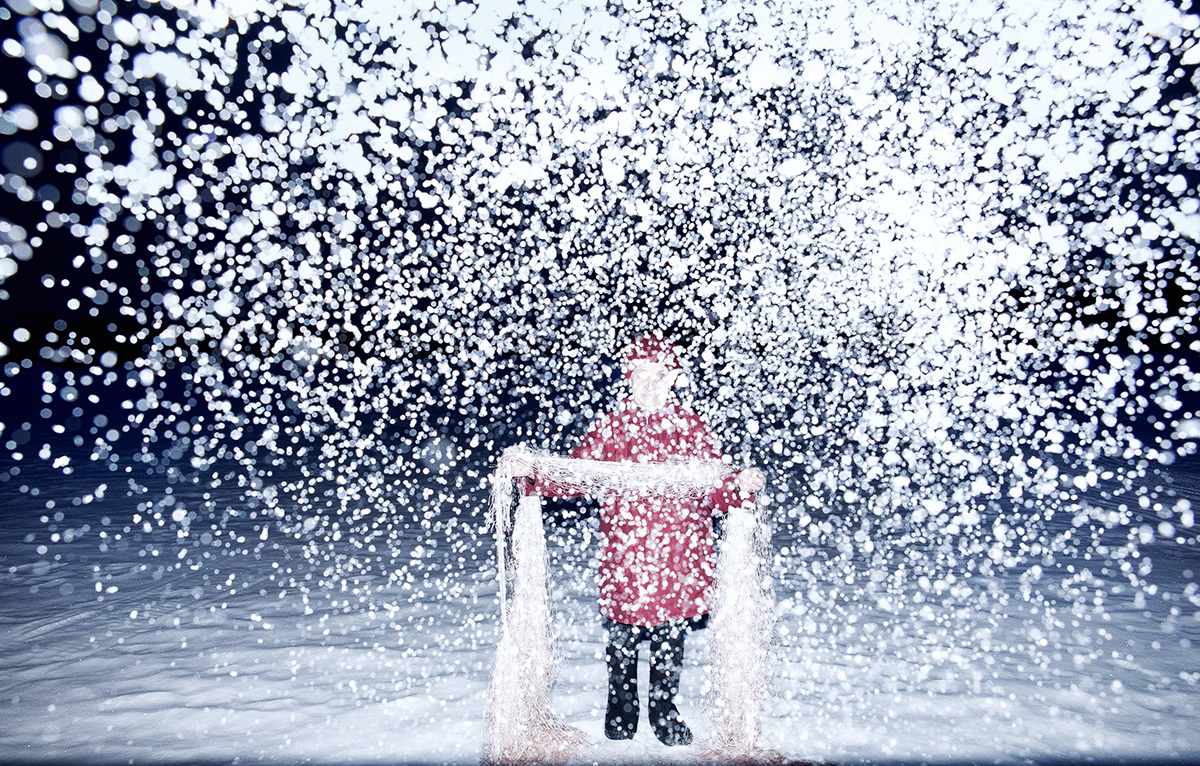
Fishing is often considered an exclusively male activity. And there are plenty of Russian superstitions relating to women and fishing. For instance: “If you encounter a woman, especially an older one, it means the fishing will be bad.” But the reality is that, in the Russian outback, women fish on equal terms with men. And in regions where there are no jobs, and where pensions only suffice to cover the most basic of needs, hunting and fishing are key to putting enough food on the table. So many women fish year-round not for pleasure, but for survival. And yet, there is also pleasure to be found. We visited several Karelian villages and went fishing with local fisherwomen. All were retirees; most all were widows; and all have been saved by fishing.Each in her own way.
Antonina Karlova
Voknavolok Village, Widow, Fishing for 12 years
Antonina Karlova used to fish all the time with her husband, Lyonya. He died during spawning season. So she thought, “I have a boat, I have a motor, I have a net. I know where to fish. Why should I buy fish?” But it was initially a bit scary to fish alone. So Antonina visited her neighbor, Galina, who had held onto her husband’s fishing tackle when he died.
“Galya, wanna go fishing?”
“You know the good spots?”
“I do. Do you know how to fasten a net?”
“I do.”
“Excellent, then you’ll be on the the motor and I’ll be on the oars.”
The women launched the boat and set off. The day was filled with lots of laughter, surprised looks from fishermen, and lots of fish. Antonina was no longer afraid to fish without her husband.
Weekends are for Whitefish
Antonina was born near the village of Voknavolok, in Karelia’s Kalevala District. She and her parents moved here, to her mother’s homeland, in 1973.
Antonina is a tall, beautiful woman with a resonant voice. She sings in a local choir, which is probably why she speaks in a singsong voice. Her house is on the shores of Lake Verkhneye Kuito – you can see it out her window. We sit in her sunlit kitchen and squint, watching Antonina’s grandchildren, Armas and Miron, play on a slide outside the window. They visit their grandmother often and love to go fishing with her. They are waiting for her to finish talking to the journalist so she can get her fishing rods.
 “My mother was Karelian,” Antonina says. “She started teaching me [to speak] Karelian when I was two. And we moved to Voknavolok when I was in the ninth grade. But before that I used to come here in the summer. I liked the countryside, the friendliness of the people. And also the fact that everywhere – at the store, at the post office – they spoke Karelian.
“My mother was Karelian,” Antonina says. “She started teaching me [to speak] Karelian when I was two. And we moved to Voknavolok when I was in the ninth grade. But before that I used to come here in the summer. I liked the countryside, the friendliness of the people. And also the fact that everywhere – at the store, at the post office – they spoke Karelian.
Voknavolok is in northern Karelia, a hundred kilometers from the Finnish border. In this unusual village, most all residents speak both Karelian and Finnish (in addition to Russian). At the local school, children study Karelian, English and Finnish. In the shops, at the school, in the Village Hall, there are always signs in Karelian.

Before the border with Finland was closed [due to Russia’s War on Ukraine], tourists frequently visited from Scandinavia and felt right at home.
Locals here, just as half a century ago, live off their vegetable gardens and the fruits of the land: fishing, picking mushrooms and berries, and, to a lesser extent, hunting. With the money they get from selling cloudberries, cranberries, lingonberries and blueberries, they maintain their houses and buy what they need. 
But the villagers’ main occupation is fishing. Surrounded by lakes, they fish in both winter and summer – with nets, with spinners, with traps, with ledger lines. They fish their whole lives, from childhood to old age. And it’s not only men, but the women as well. Mostly, the women are pensioners. As they explained: when there was work and children, there was no time for fishing. But as they got older, a new freedom arrived.
“My passion for fishing comes from my father,” Antonina says. “When I was little, he used to take me out at dawn. Now Miron, my grandson, also loves to fish. He’s always asking me: ‘Grandma, when are we going fishing?’ When I was married, I used to fish with my husband, helping him. When the vendace spawns, the entire village gets going, it’s an event! My husband spent his weekends fishing for vendace. During the spawning period, we had a whole crew. Lyonya was in charge; he was at the motor. And we would help out, taking the fish from the net. At home, Olya and Sveta, my friends, would help me clean them. And Lyonya would wash them. And then we would divide up the haul… The fish was so useful! I used the oven for canning them, with tomato and with oil, and it lasts all winter. We freeze plenty, and I have several freezers at home!
The Men Doff Their Hats
Antonina’s husband died 12 years ago of “some kind of pneumonia.” Antonina had just returned from the sanatorium, where she had gone with her friend Olga.
“It was early spring. Before I left, Lyonya and I went fishing on a snowmobile. He made a hole for me. Oh, how I was fishing that day! As soon as I dropped the line in, they would bite. Roach, perch. I reeled them in one after another. I shouted to Lyonya: “The fish are biting so well, throw all the lines in!” And he made a hole nearby, and we fished and fished… We were so happy! It was as if the lake had decided to compensate us for our last time fishing together. Then I went to a resort with Olga, and that was it…”
It was difficult for Antonina to go back out on the lake in a boat without her husband. But after her first fishing trip with Galya, things started going well.

“Galya and I became close when Lyonya died,” Antonina says. “She is a Finnish teacher. She supported me, and we walked and talked. And then we started fishing. When the vendace started to run in the fall, we took the boat out to set nets. Everywhere, men were setting their nets, and there we were, two women. The men waved and doffed their hats!”
According to Antonina, they never heard any joking at their expense. There was no disdain. The men in the village respect the fisherwomen and are always ready to help.
“Once, the drain plug came out of our boat, and the water started rushing in,” Antonina recalled. “So the men immediately came over and helped. Of course, sometimes someone might make fun of us, but in a good way. One year, we were fishing on Teachers’ Day. We weren’t very good at it, and we were laughing in the boat the whole time. Then we went to visit with a fellow, and he said, ‘It looked to me like you weren’t fishing, but celebrating Teachers’ Day in the boat. Because you can’t laugh like that when you’re sober!’”
 “Galya and I were always laughing… We loved fishing so much! At seven o’clock we’d go out – the sun was rising, the cuckoo was calling. Oh, how wonderful it was! We’d raise our oars, shiver in the cold, and just listen…
“Galya and I were always laughing… We loved fishing so much! At seven o’clock we’d go out – the sun was rising, the cuckoo was calling. Oh, how wonderful it was! We’d raise our oars, shiver in the cold, and just listen…
“Once we went fishing in the rain. A rumor had made the rounds of the village that someone had cast nets and pulled in vendace. So we had to go! Then, halfway there, the engine died. We started thinking where we might get some help. It was pointless to go back to our shore, as we had no men there: one wasn’t home, another was bedridden, the third was drunk. So we rowed to the opposite shore and started knocking on doors. At the first one, the man had left, at the second he was at work. Galya threw up her arms: ‘I thought it was only us who didn’t have men, but they have the same problem here!’ And we laughed. In the end, a woman called her husband, who was at work, and he made a special trip home. And he sorted out the engine. And we were soaked through, but instead of going home, we set the nets. The next day we could barely raise them, there were so many vendace!”
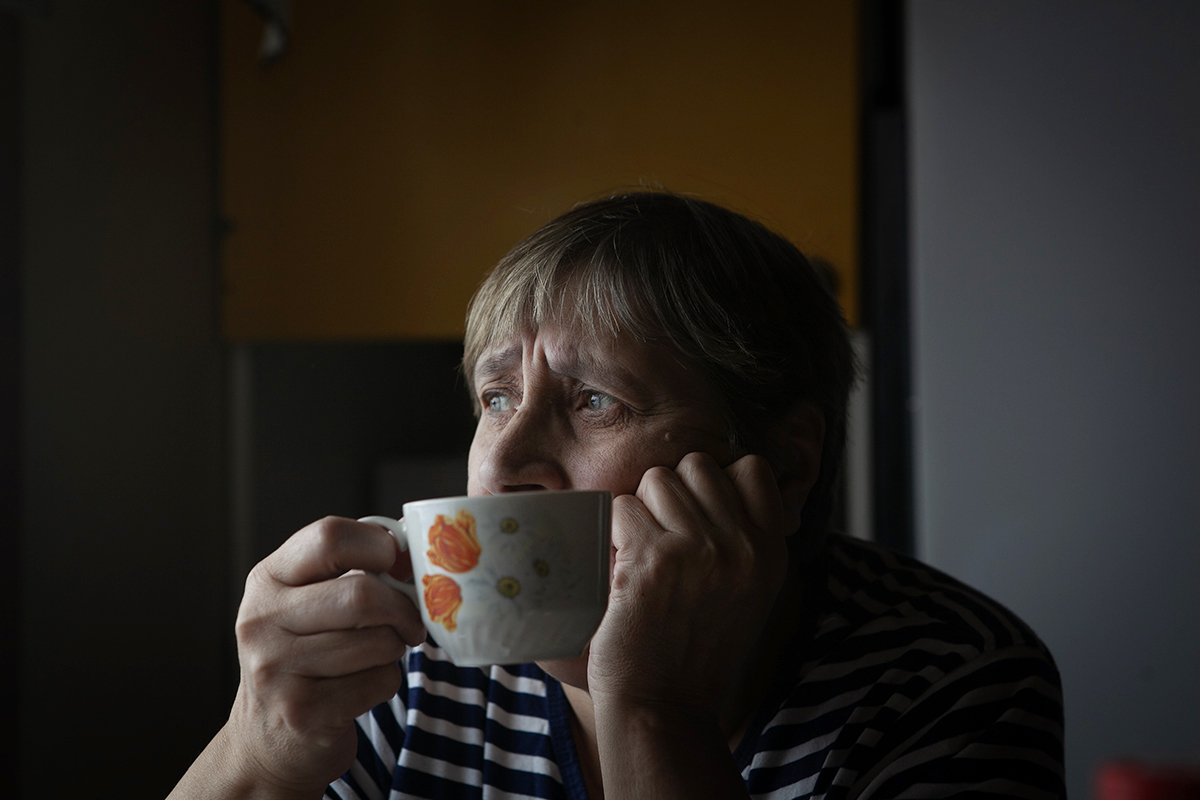
Alone Again
Last year, Galina’s son, who lives in the city, couldn’t get through to his mother. So he asked a neighbor to check if she was okay. Galina was found lying on the floor, motionless. She’d had a stroke. She was taken to the hospital, and then to a nursing home for bedridden patients. Galina’s condition is very bad.
“Galina will probably never be the same,” Antonina says. “She’d been lying there too long; she wasn’t found in time.” Her sonorous voice drifts off. “She doesn’t walk, doesn’t talk. I’m afraid to go see her. If she understands everything, then I’m afraid that she’ll be stressed when she sees me. And maybe she’ll get worse. I miss her…”

All winter, Antonina keeps the heat going at her friend Galya’s house. A house is like a person, you can’t leave it in the cold. She goes over, heats it up, and waits for a few hours. “It’s not hard for me. We all help each other here,” she says.
I ask Antonina, who she will fish with now? Summer is coming soon. She sighs.
“I’ll invite Olga to the spawning,” she says. “She’s not a fisherwoman, but she’ll be happy to help. If the borders hadn’t been closed, I would have gone to Finland, to my friend Tula. We could have fished together. But we’re cut off…”
Finland closed its borders with Russia for an indefinite period in April 2024. For residents of border villages and towns, it was a tragedy: friends and entire families were separated.
“Before the borders closed, I managed to go to Finland to say goodbye to everyone,” Antonina says. “I have a daughter and a grandson there. And my friends, Tula and Ritva, are still there. I used to go fishing with them there, both in winter and in autumn… We would catch some fish, laugh our heads off, and then make tea over the fire, and fish soup. It was so great! And in the evening, there was a sauna. They were right next door, about twenty kilometers from the border. We used to go there, back when we had multiple-entry visas, as if we were going to the store for bread. I remember how, once, Ritva, Tula, and Olga and I went to Valaam. We piled into a trailer and drove through the Vyartsilya border checkpoint. We played cards the whole way… We had such a strong friendship, and now we can’t visit one another. We communicate on WhatsApp every day. We dream of the border reopening!”
A Happy Life
“I can sit a l-o-o-o-ng time with a fishing pole. If a fish takes a nibble, that’s it, I’ll be on the ice until dark,” Antonina says while pulling on her fishing boots.
Today is March 8 [International Women’s Day], but that doesn’t stop the fisherwoman. It’s quite easy to fish near her home: you don’t have to bring tea or dinner and can run inside to warm up. But Antonina says she doesn’t get cold. Just a few layers of clothing and a fishing chair with a wool cushion – that’s all she needs to sit for hours.
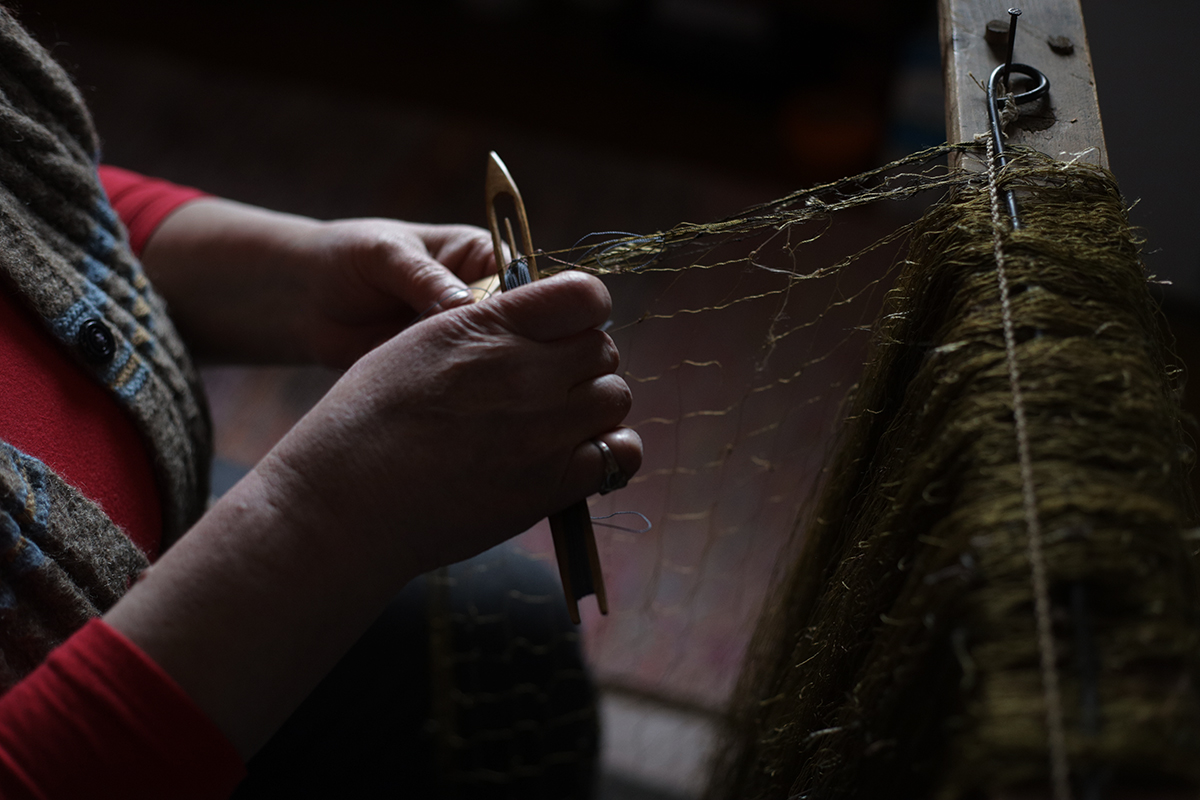 “Not many people like to go fishing with me, because it’s impossible to get me to go home. But my grandson is growing up to be the same sort of fisherman. When I can’t row any longer, maybe he’ll take me out. Meanwhile, I can go out by myself with the motor. I already can’t make holes in the ice with the auger – my hands hurt too much. So I ask my neighbor. He never refuses.”
“Not many people like to go fishing with me, because it’s impossible to get me to go home. But my grandson is growing up to be the same sort of fisherman. When I can’t row any longer, maybe he’ll take me out. Meanwhile, I can go out by myself with the motor. I already can’t make holes in the ice with the auger – my hands hurt too much. So I ask my neighbor. He never refuses.”
Antonina says that summer fishing out of the “pit” – using a weight that rests on the bottom – is her favorite: “You can fish every day in summer, but in winter there’s either frost or water on the lake.” Mainly they catch perch, roach and pike. The biggest fish she ever caught was a five-kilogram pike.
 One would think you’d never use up so many fish… But the catch never goes to waste. Antonina makes every kind of dish, from ukha (fish soup) to cutlets. She sends fish to her children in the city, or feeds it to the neighbors’ cats.
One would think you’d never use up so many fish… But the catch never goes to waste. Antonina makes every kind of dish, from ukha (fish soup) to cutlets. She sends fish to her children in the city, or feeds it to the neighbors’ cats.
We haven’t been fishing for long and haven’t had time to catch anything when our photographer, stepping back to capture a good shot, sinks up to her knees in a newly formed sinkhole of water. So we head back to the house to dry out. But we leave Miron behind. “I’m not leaving until I catch something,” he says.
Over tea, Antonina says she is living her best life. She has so many hobbies that she simply can’t understand the question when we ask if she ever gets bored, alone in the village.
 “I like it here. I have a singing group, I participate in all the holidays. We study the Karelian language in the Village Hall – we translate and have discussion groups. There’s work at home. I embroider and knit. Summer is so busy! There is the greenhouse, the garden, and berries in the forest. And the fish are always calling to me. And my grandson visits. When is there time to get bored?”
“I like it here. I have a singing group, I participate in all the holidays. We study the Karelian language in the Village Hall – we translate and have discussion groups. There’s work at home. I embroider and knit. Summer is so busy! There is the greenhouse, the garden, and berries in the forest. And the fish are always calling to me. And my grandson visits. When is there time to get bored?”
Twenty minutes later, Miron rushes past the window clutching a fish in his fist.
“Grandma’s little boy,” Antonina says, looking out the window. And when her grandson tosses his tiny fish into the sink, she lovingly praises him, “Well done! What a perch, wooow! Yes, you’ve become quite the fisherman!”
Miron beams.
Nadezhda kirollova
Voknavolok Village, Widow, Fishing for 5 years
Nadezhda was born in Voknavolok and lives in a small home with her two grown sons. In the yard is a pile of logs, unsplit since the fall.
The home has an unheated entryway, a large room with a stove, and several small rooms – a classic floorplan.
While Nadezhda gets dressed to go fishing in a room with yellow curtains for a door, I chat with one of her sons about life in the village.
He says that he and his brother have no work – it’s difficult to find. As to how they manage, he says, “Mama feeds us fish, she’s constantly out fishing.”
“Do you help her?”
“No, I only catch fish from the frying pan.”
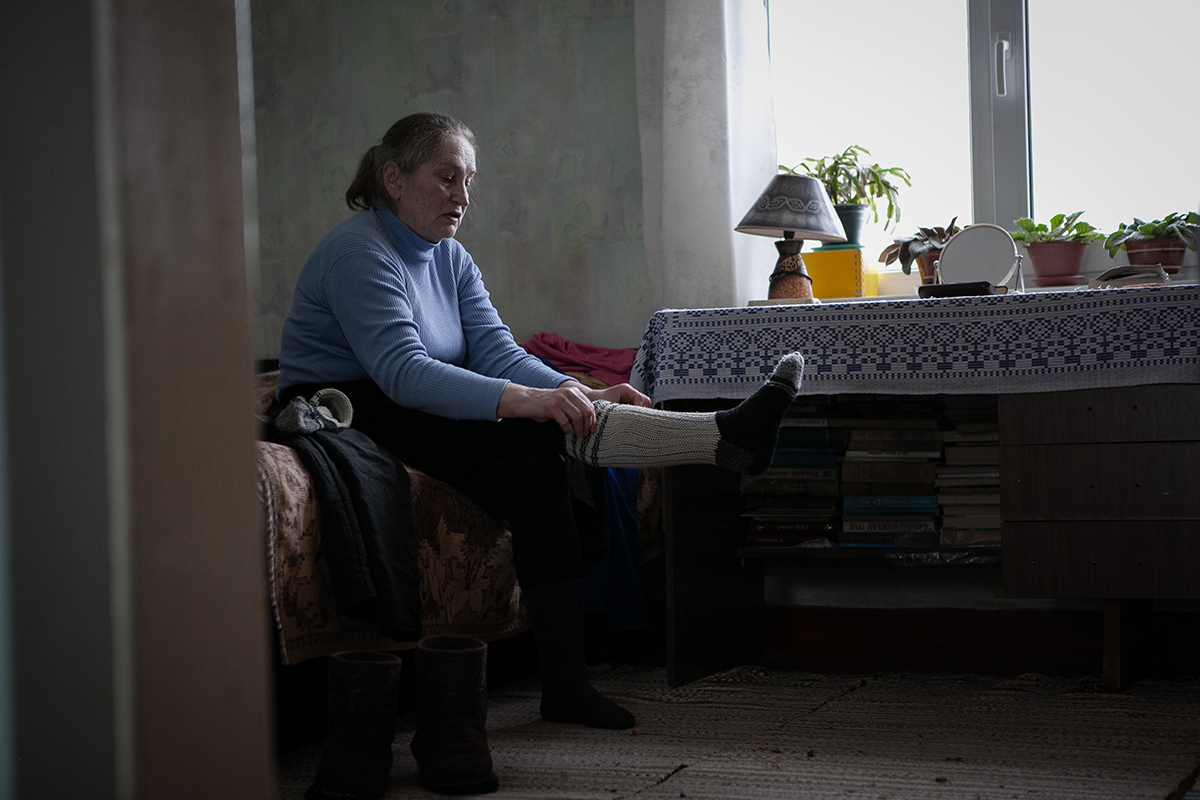 Nadezhda travels far from home and usually spends the entire day on the lake. So as not to freeze, she dons four pairs of socks (including knee socks and slippers she knitted, and insulated “chuni,” boot liners – they are ragged, but still keep you warm, it’s a pity to just toss them out), a blouse, two sweaters, two jackets, a warm vest, a scarf, and three layers of pants. Layering clothes allows you to stay warm for a long time. And, if she gets cold despite this, Nadezhda makes a fire.
Nadezhda travels far from home and usually spends the entire day on the lake. So as not to freeze, she dons four pairs of socks (including knee socks and slippers she knitted, and insulated “chuni,” boot liners – they are ragged, but still keep you warm, it’s a pity to just toss them out), a blouse, two sweaters, two jackets, a warm vest, a scarf, and three layers of pants. Layering clothes allows you to stay warm for a long time. And, if she gets cold despite this, Nadezhda makes a fire.
Nadezhda takes along her 10-year-old dog Millie. Millie lives in a pen and so, when the fisherwoman lets her out, she jumps up and down enthusiastically and dives into the snow. Nadezhda speaks Karelian to her dog and Millie understands her. Kirillova has a pronounced Karelian accent; she did not speak Russian as a child. Her voice sounds like the sweet murmuring of a river. 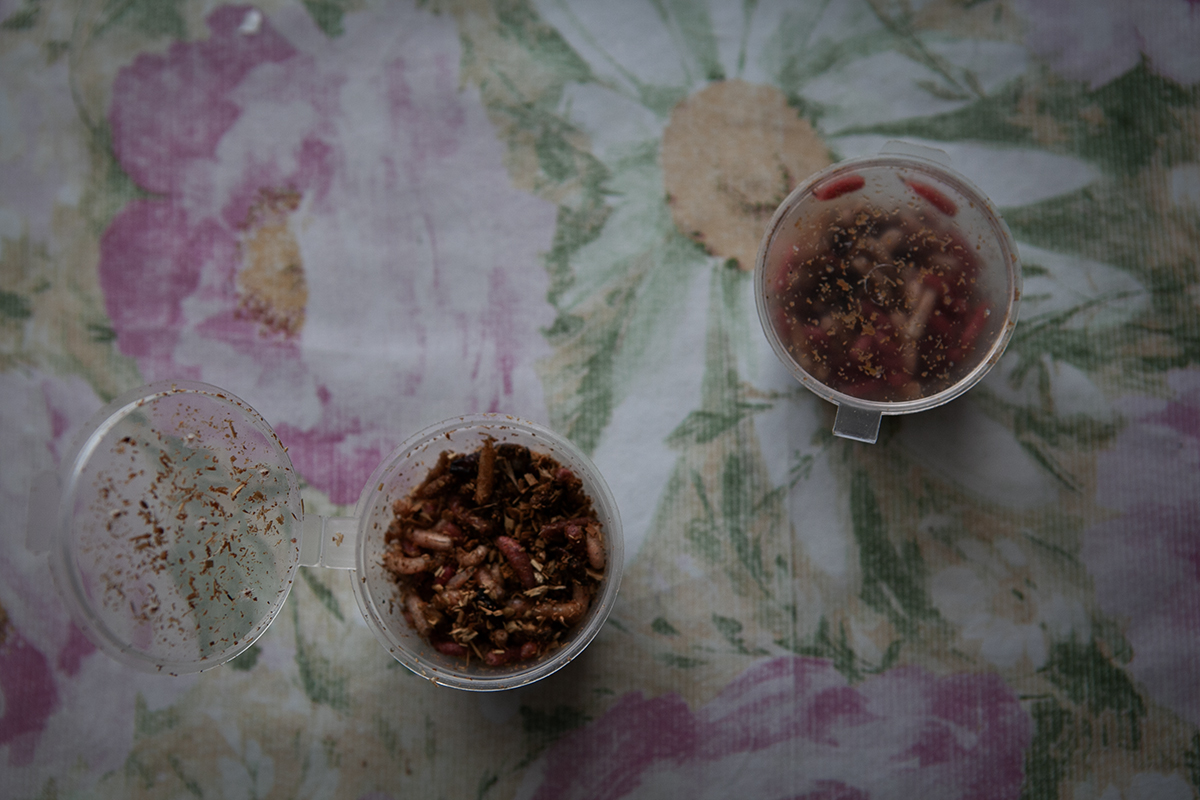
The family cat accompanies us to the door when we leave. A purebred male Briton, gifted from some relatives, he’s not allowed outdoors. A few cats here have already been lost to wild dogs.
“That’s how it is, the girls go fishing and the boys stay at home,” Nadezhda says, nodding toward the house, where her cat and sons have stayed behind. 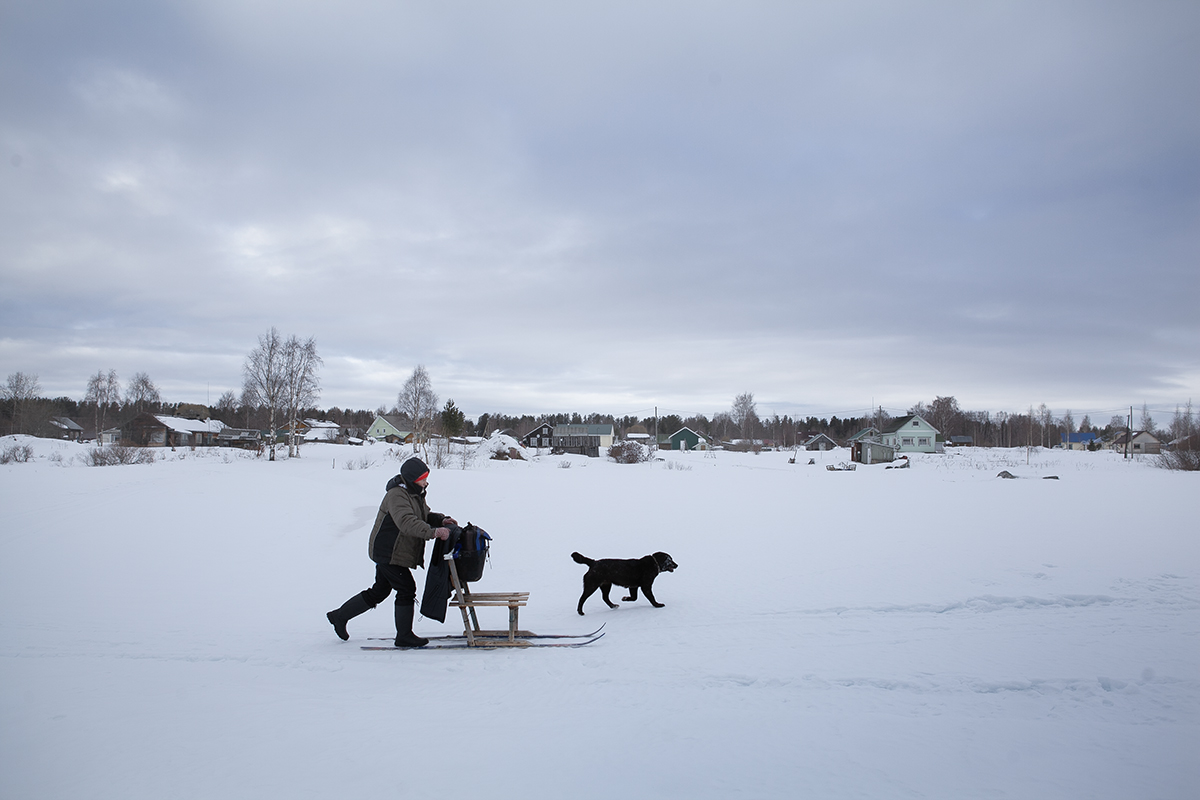
She assembles her gear into a Finnish potkuri sled and, holding onto its tall back, walks through the village toward the lake. Millie runs on ahead, constantly diving into the snow – clearly, she is more excited about the fishing trip than her owner.
Not a Good Day
Like many locals, Nadezhda first picked up a homemade fishing rod when she was a child. When she got married, there was no time for fishing: three sons and a daughter, a husband, work. And where didn’t Nadezhda work! In a store, at a post office, in a nursing home, on a farm, as a social worker… After the children grew up, she began fishing on the occasional weekend with her husband.
“I was more enthusiastic than Vitya,” she says. “Nothing was biting, and he’d say, ‘That’s it, let’s go home!’ ‘Oh, come on,’ I’d say, ‘Want me to switch your bait?’ ‘No!’ Or he’d start boiling tea and then call out for me to come. But I was fishing, I didn’t have time for tea. He’d insist: ‘C’mon, it’s getting cold.’ I’d have to put down my fishing rod and drink. And, after we drank tea, he’d head home. And I’d say: ‘No, I’m going to keep fishing!’”
 Victor died five years ago. He was a heavy drinker and one day, on Nadezhda’s birthday, he didn’t wake up.
Victor died five years ago. He was a heavy drinker and one day, on Nadezhda’s birthday, he didn’t wake up.
“I would say to him: ‘Vitya, don’t drink, live…’ Nadezhda remembers quietly. At first, I loved him, and then I felt sorry for him, probably… After Vitya was buried, I thought: ‘I’ll go fishing.’ We’d just bought a boat, so why just let it sit there? I went to the river. I caught bass and pike on a spinning rod. Since then, I’ve been fishing alone.”
Nadezhda has no interest in getting remarried. 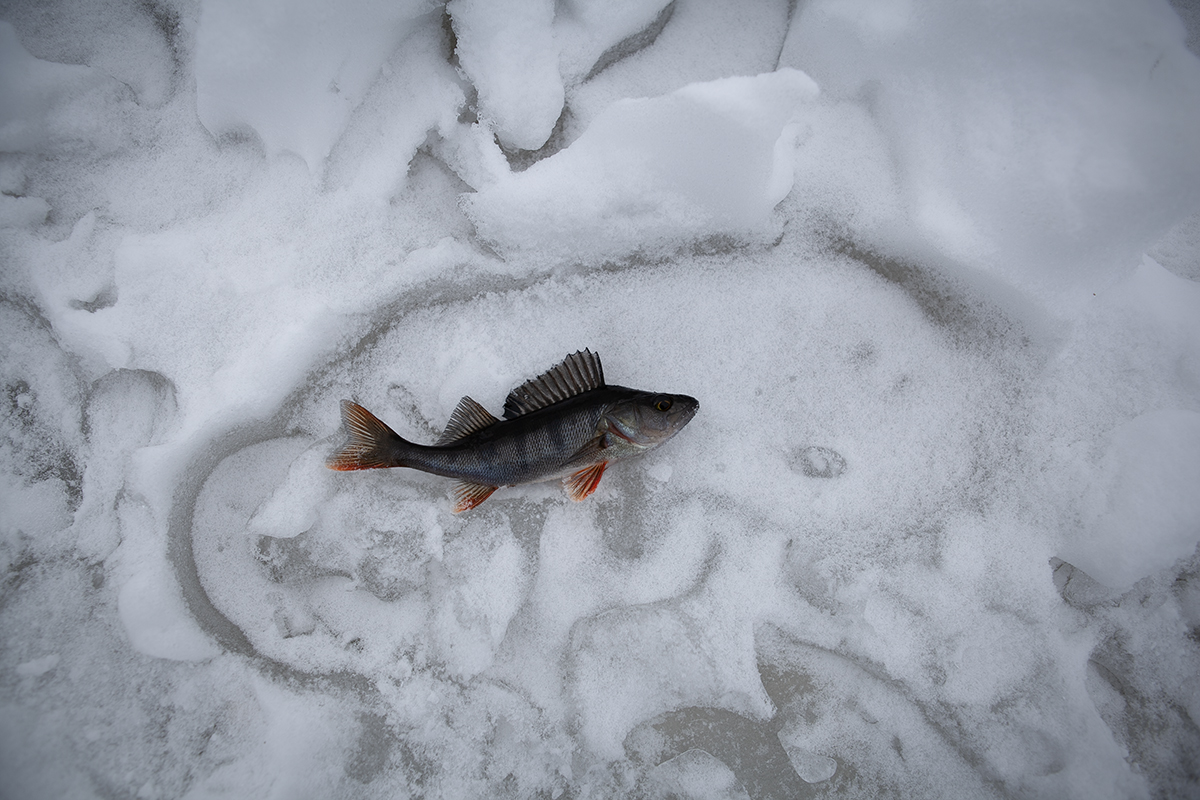
“I already have two men, two sons… And there are no men in the village that would suit me. How would I live with them, what would I talk about? I’m used to going it alone.”
“Do you fish with nets?”
“No, no one to fish like that with.”
“No girlfriends?”
“I don’t have any girlfriends… Sometimes a cousin comes from Kostomuksha, and she’s also an avid fisherwoman, so we go fishing together.”
Nadezhda explains all this while bent over her fishing hole. We’ve been sitting for about fifteen minutes. Nothing is biting.
“Today is not a good day according to the lunar calendar,” Nadezhda says. “We need to try another place.”
She quickly gathers her equipment, gives the sled a push, and heads toward the islands looming on the horizon.
Happiest Days
Nadezhda’s hand hurts, so it’s hard for her to bore into the ice with an auger. She drills a bit, rests, then drills again. In between, she says:
“My grandmother fished a lot. She gave birth to 11 children, five survived. Yet it was still hard to feed them. Back then, women were very involved in fishing, not like now. The men had haymaking, firewood, other things to do. Our grandmothers fished to survive. When we were kids, we had barrels all around the house. In one, perch, in the other, salted roach… And we dried lots of fish. Mom, when she was older, after Dad passed away, she and I also put out nets. Then, somehow, everything changed… Now for many, fishing is just a hobby.” 
“How about for you?”
“It is both food and pleasure,” she answers. “We live on my pension now, so the fish feeds us. I salt it, make fish soup, bake fish pies. Most of all, I love fried perch and cutlets. For the dog, we cook a fish porridge. The garden also helps, we don’t go hungry… Of course, you can’t buy everything you want. But we’ll survive, it’s not bad. In general, I like being alone with a fishing rod, sitting in silence. In winter, you sit on the lake, surrounded by the white, the quiet… Such beauty! This is where I find peace.”
At a new hole, the fish suddenly start biting. Nadezhda hauls up the perches one after the other. Her face brightens. 
She says she likes summer fishing best of all because in the summer you can “get away from everyone for a long time.” Sometimes she doesn’t want to go home, and even spends the night in her boat.
“I don’t sleep well, so I just sit and look at the stars. I drink tea,” she says.
“Aren’t you scared at night?”
“What is there to be afraid of?” 
When the photographer and writer are frozen through, Nadezhda takes out a thermos and some bread and sausage. She chews slowly, looking off into the snowy distance. I ask her to recall her happiest day fishing.
“Probably when my niece Lena and I went fishing together. We set a line and they began to bite. We caught so many perch! We even caught a pike.”
“So what was the happiest day of your life?”
“I don’t know, all my days are the same… When the guys are sober, then I have my happiest days. When they are not at home, my mind goes everywhere. I sleep with the door open. I worry. I call them, just to hear their voices, to know that they are alive. After all, it’s winter, they can fall down somewhere and freeze to death… So, when they are at home, those are my happiest days.”
After this unexpected confession, everything falls into place. Fishing truly saves her, but not from hunger.
Bereginya
We return home as evening is falling and Nadezhda puts on the kettle.
She has lots of photos in the shelving unit in her room – of her sons, her parents, her graduating class. Nodding toward the latter, Kirillova sighs, “Many of the people in the photo are no longer with us. Died of drink… Myself, I’ve never been drunk in my life. If I’d turned to drink, I too would be in the cemetery by now.”
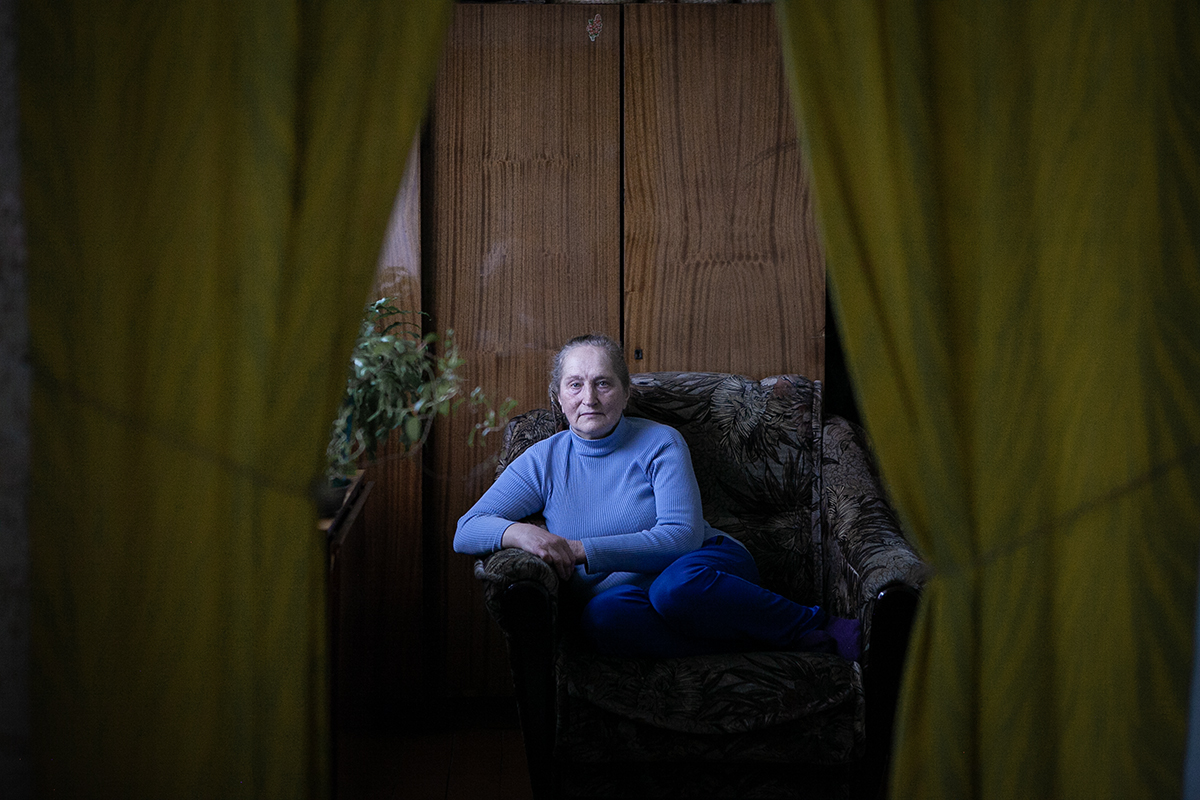 I ask how she manages to purchase such expensive fishing tackle. She answers that her sons and other relatives have gifted much of it to her: oars, spinning rod, ice boring auger, lures. She has a hard time remembering anything she has bought for herself. It turns out there were some socks. And apples. She loves apples.
I ask how she manages to purchase such expensive fishing tackle. She answers that her sons and other relatives have gifted much of it to her: oars, spinning rod, ice boring auger, lures. She has a hard time remembering anything she has bought for herself. It turns out there were some socks. And apples. She loves apples.
Nadezhda says that she has everything and needs for nothing. Then again, her electric stove has started misbehaving, and she would really like a new one, because cooking on a wood stove is difficult and takes a long time.
“My most treasured gift is from my grandson Vanya, when he was in second grade,” she says. “He’s 18 now, and he and my daughter live in Finland.”
She brings out a small rag doll.
“He made me this, Bereginya. It’s my talisman, it protects me from all sorts of evil.”
Olga pekshuyeva
Voknavolok Village, Widow, Fishing for 2 years
Olga Pekshuyeva, a pretty woman who is quick with a smile, was sent from Priozersk to teach in Voknavolok. For 36 years she has been teaching math and physics. Recently, she added chess and physical education.
Olga has a spacious home that is literally permeated with the smell of her fishing hobby from the boots, nets, and jackets scattered throughout. A plate full of fried vendace lies on the table. 
“When I arrived, everyone spoke Karelian, and I didn’t know the language. You go into a store, and everything is in Karelian. You stand there and don’t understand a thing,” she laughs.
She had also been recommended to us by other locals as an avid fisherwoman. Olga always participates in Kuitin Kala, the Winter Fishing Festival. Her team consists of herself, her son, and a few students that she has infected with a love of fishing. 
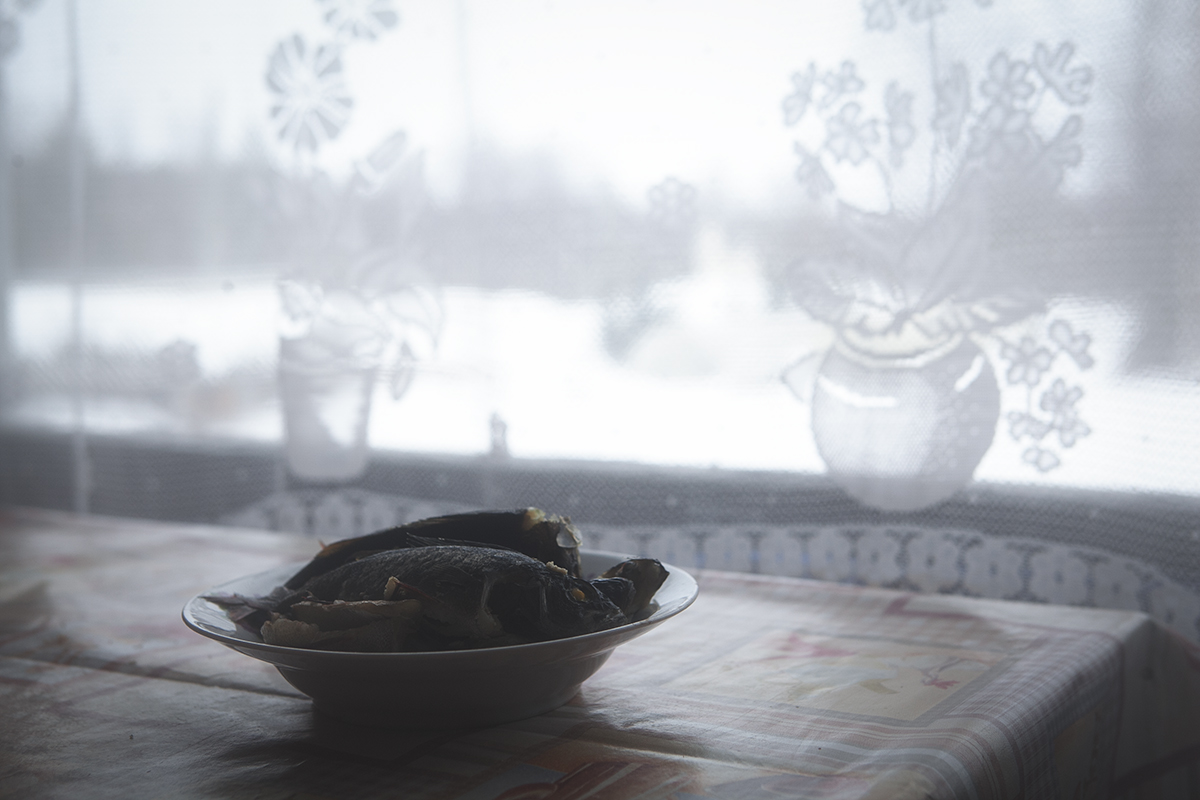 “I developed a passion for fishing through my husband,” Olga says. “He’s Karelian, and Karelians are all fishermen. My husband was always in charge of the fishing; I played second fiddle. Two years ago, he died – cancer, and, well, he drank too much. He was only 55. And our sons, Roma and Pasha, are already grown, so we started fishing together. When I go fishing, I wear my husband’s work jacket, he worked in the Ministry of Emergency Situations. I am good at every part of it. Recently I even learned how to cast a spinning rod.”
“I developed a passion for fishing through my husband,” Olga says. “He’s Karelian, and Karelians are all fishermen. My husband was always in charge of the fishing; I played second fiddle. Two years ago, he died – cancer, and, well, he drank too much. He was only 55. And our sons, Roma and Pasha, are already grown, so we started fishing together. When I go fishing, I wear my husband’s work jacket, he worked in the Ministry of Emergency Situations. I am good at every part of it. Recently I even learned how to cast a spinning rod.”
 Olga has four children. Two of her daughters got married and moved away, and Roma, 26, and Pasha, 17, an 11th-grader, live with her. They all like to go fishing places that are farther away, putting on hunting skis and skiing through the forest to the lake. They enjoy the process, even when they don’t catch anything.
Olga has four children. Two of her daughters got married and moved away, and Roma, 26, and Pasha, 17, an 11th-grader, live with her. They all like to go fishing places that are farther away, putting on hunting skis and skiing through the forest to the lake. They enjoy the process, even when they don’t catch anything.
 “I love the process of getting to our fishing spot, it’s a whole adventure! The campfire, drinking tea around the fire. In the summer, I like to fish from the shore. I dig up some worms and just stand there. My son is out of school, and I’m also off for the summer, and we fish together!”
“I love the process of getting to our fishing spot, it’s a whole adventure! The campfire, drinking tea around the fire. In the summer, I like to fish from the shore. I dig up some worms and just stand there. My son is out of school, and I’m also off for the summer, and we fish together!”
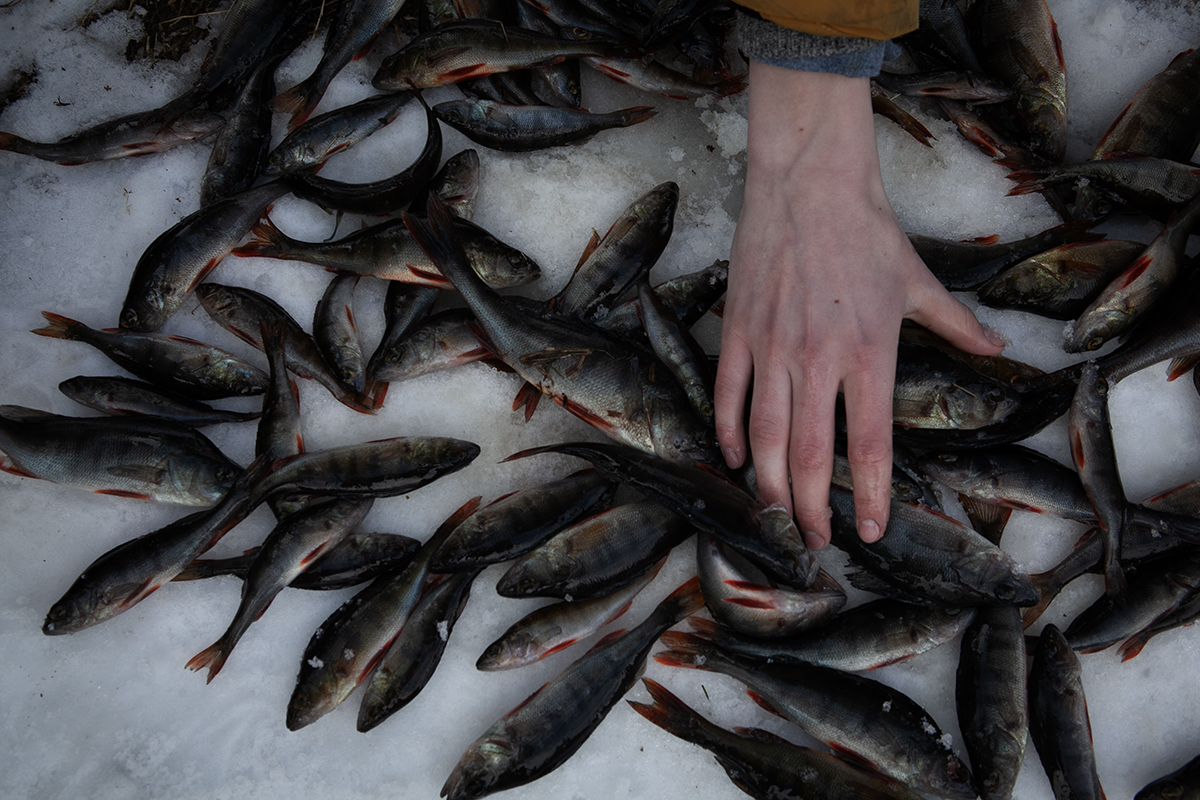 Everyone in Olga’s family eats fish, including the chickens. But for her fishing is not about survival, it’s simply about joy and a way of finding a common language with her children and students.
Everyone in Olga’s family eats fish, including the chickens. But for her fishing is not about survival, it’s simply about joy and a way of finding a common language with her children and students.
Aside from fishing, Pekshuyeva has other hobbies: chess and singing in a folk choir. She won’t even entertain the idea of getting married again: “Why? Everything is fine as it is.”
Lyubov Filippova
Vedlozero Village
Lyubov Filippova lives in central Karelia, in the village of Vedlozero. Here, as in Voknavolok, there are several inveterate fisherwomen, and Lyuba is one of them. Yet she calls herself more of a beginner.
In the morning, we find Lyuba on the lake with her father. Her father, a fisherman, took Lyuba to the lake often when she was little. Then she got married, and fishing was replaced by family and work. After the children grew up, Lyuba began fishing with her husband, mainly in the summer. But recently she left her position as secretary to the head of the village administration and started taking shifts at the general store. Now, with more free time, she has begun to fish more often, including alone.
“I remember the first time I got ready to go fishing. I got up early in the morning and got everything ready. My husband came home from the night shift and was stunned: ‘Seriously? You’re going fishing? Alone?’ And I said to him: ‘I’m sick of everything, I’m going!’ And off I went. The housework’s not getting done,” she laughs. “It all rests on my shoulders, after all. So that I could go fishing today, I tried to get as much done yesterday as possible. When I quit my job – next year I might retire – then I’ll start going more often and trying different types of fishing!”
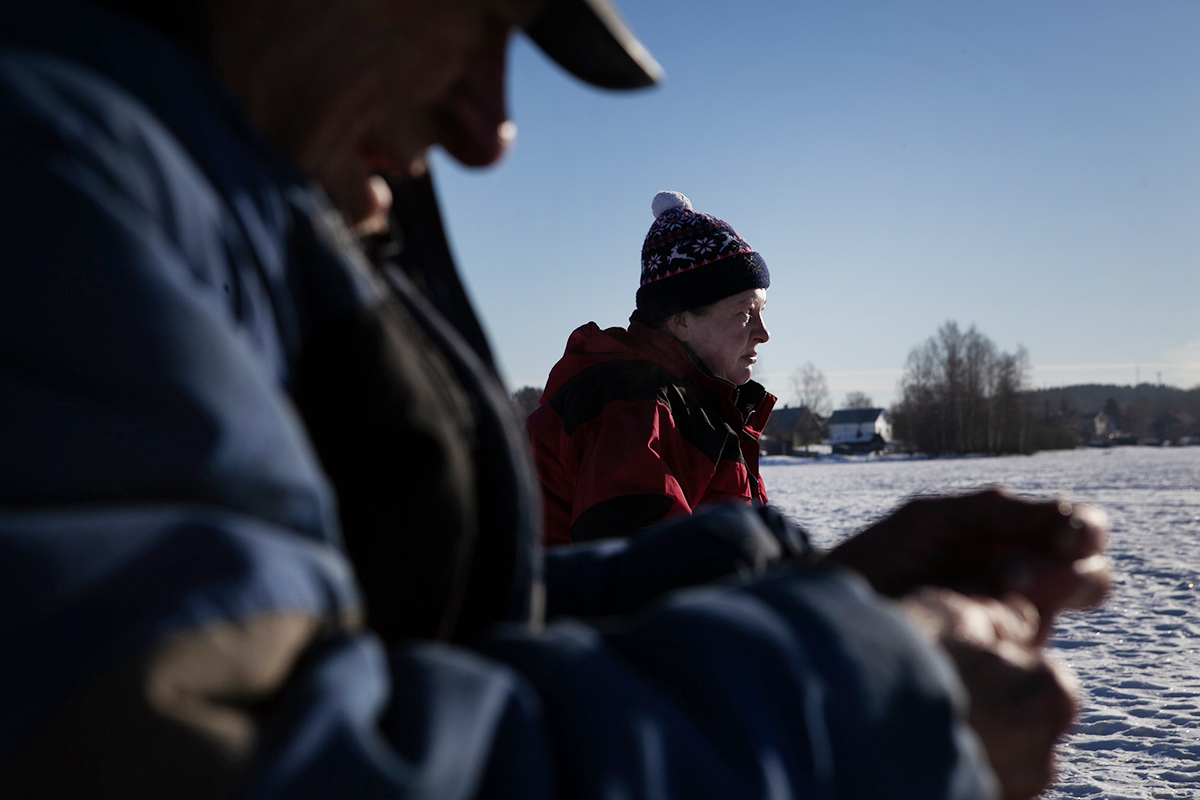 Lyuba says she used to see fishing as an exclusively male activity. But when she started fishing herself, she began to see it differently. Yet there are still some “nuances.” For example, due to simple physiology, drilling holes is harder for women. Her elderly father still drills ice holes for Lyuba. It’s also harder for a woman to go to the toilet in the cold. Sometimes, when you are sitting in the middle of a lake, this can be a real problem.
Lyuba says she used to see fishing as an exclusively male activity. But when she started fishing herself, she began to see it differently. Yet there are still some “nuances.” For example, due to simple physiology, drilling holes is harder for women. Her elderly father still drills ice holes for Lyuba. It’s also harder for a woman to go to the toilet in the cold. Sometimes, when you are sitting in the middle of a lake, this can be a real problem. 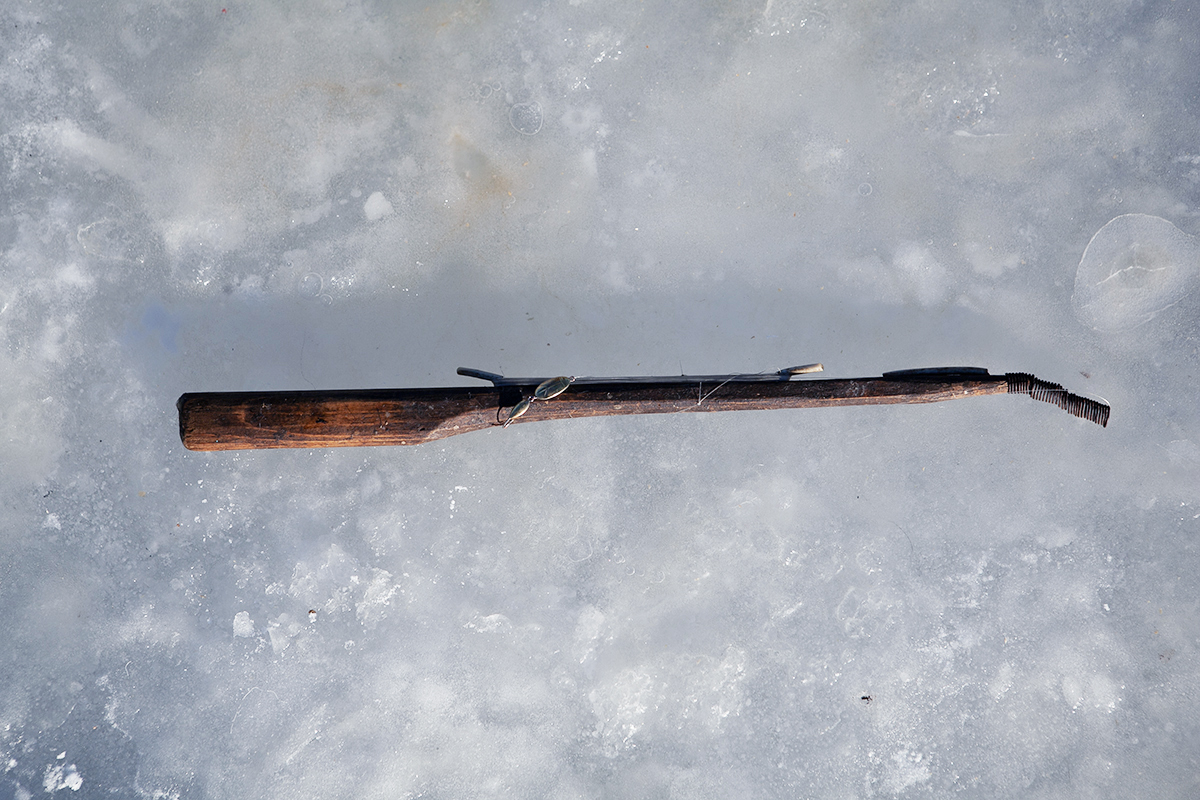
“Generally speaking, I like to drink a lot of water. Previously, I used to take a bottle of water with me when I went fishing. And I have to take medicines that have a diuretic effect, and that’s a disaster. I either don’t drink water or skip the medications before fishing.
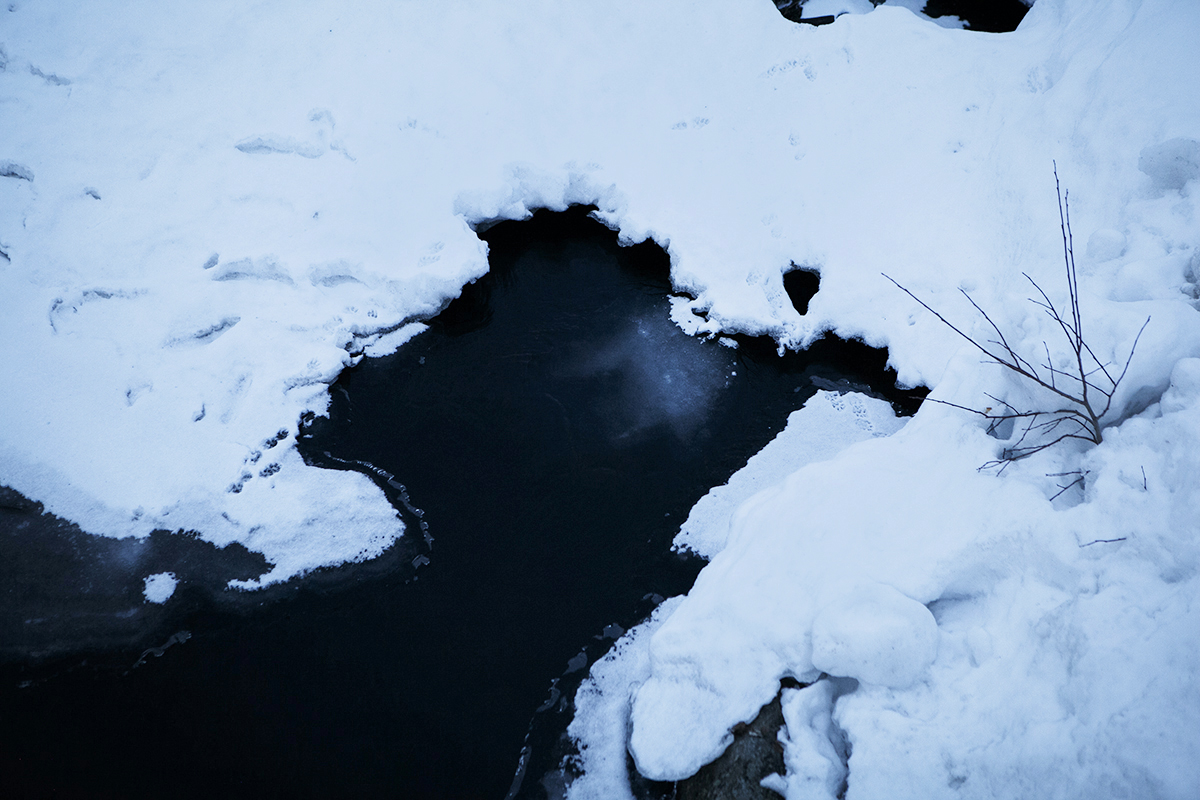 According to Lyuba, if you really need to relieve yourself, you have to go into the nearest forest. Most men do the same. There is a superstition that you don’t pee on the ice.
According to Lyuba, if you really need to relieve yourself, you have to go into the nearest forest. Most men do the same. There is a superstition that you don’t pee on the ice.
Lyuba’s friend, the local activist Natalya Antonova, has a family legend about this.
“My mother had an older sister, Rosalia,” Antonova explains. “Her husband became very ill – he began to lose his mind. There were many healers in the villages at that time. So Rosalia went to one, and he said: ‘This is a serious matter, you need to go to the forest spirits and ask them what’s wrong. I’ll go to them, come with me if you’re not afraid.’
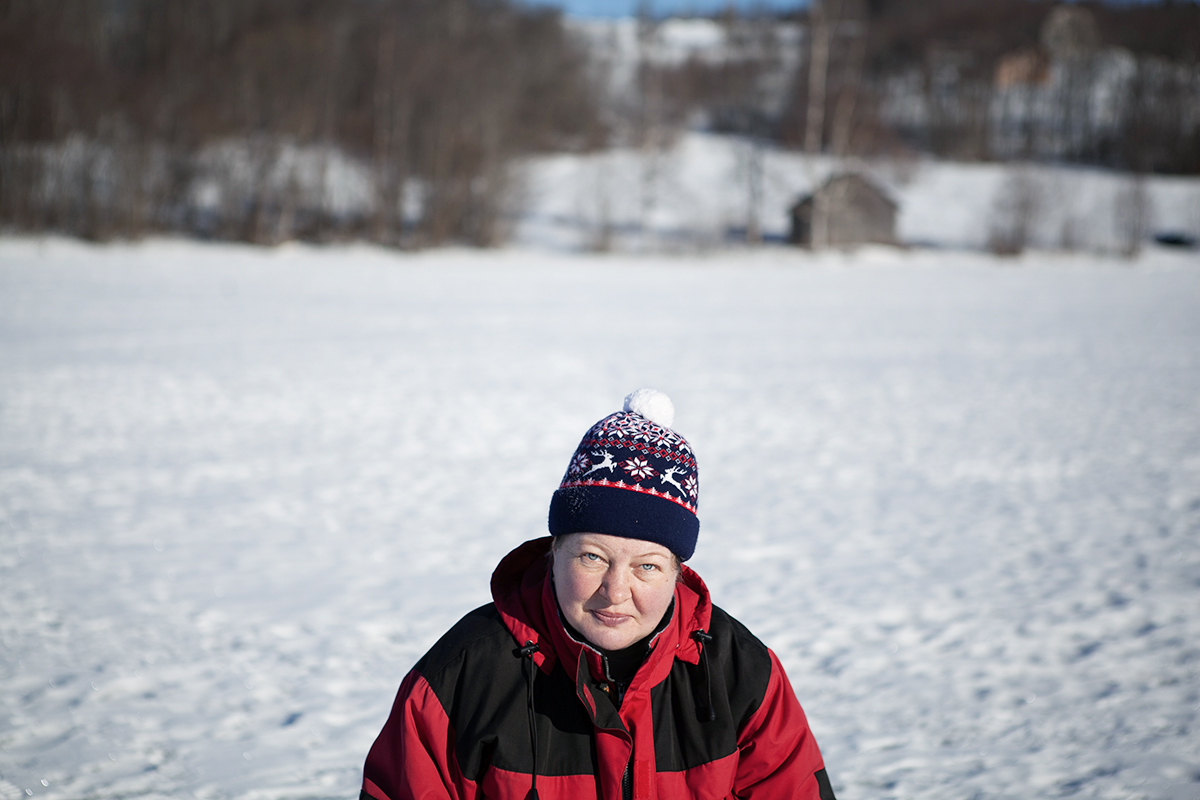 “Rosalia later told her mother: ‘We went to the edge of the forest, the healer told me to watch from a distance, and he went deeper into the forest. I saw three men of incredible size, with long hair and beards walking towards him. He talked to them, then they turned around and went back into the forest.’ The healer returned to Aunt Rosa: ‘Things are bad with your husband. He peed in the water and it ended up on the water spirit’s table, literally pissed on the water spirit’s table. He got angry and brought the disease upon your husband. I’ll try to help, but I can’t promise anything.’ The healer prepared a saline solution, which was to be drunk and then used to wipe down Rosalia’s husband. He pronounced an incantation over the salt. The husband died anyway. Apparently, he had greatly offended the water spirit. And that is why old Karelians know that you cannot pee on the ice. If you have an urge, you must go to the shore.”
“Rosalia later told her mother: ‘We went to the edge of the forest, the healer told me to watch from a distance, and he went deeper into the forest. I saw three men of incredible size, with long hair and beards walking towards him. He talked to them, then they turned around and went back into the forest.’ The healer returned to Aunt Rosa: ‘Things are bad with your husband. He peed in the water and it ended up on the water spirit’s table, literally pissed on the water spirit’s table. He got angry and brought the disease upon your husband. I’ll try to help, but I can’t promise anything.’ The healer prepared a saline solution, which was to be drunk and then used to wipe down Rosalia’s husband. He pronounced an incantation over the salt. The husband died anyway. Apparently, he had greatly offended the water spirit. And that is why old Karelians know that you cannot pee on the ice. If you have an urge, you must go to the shore.”
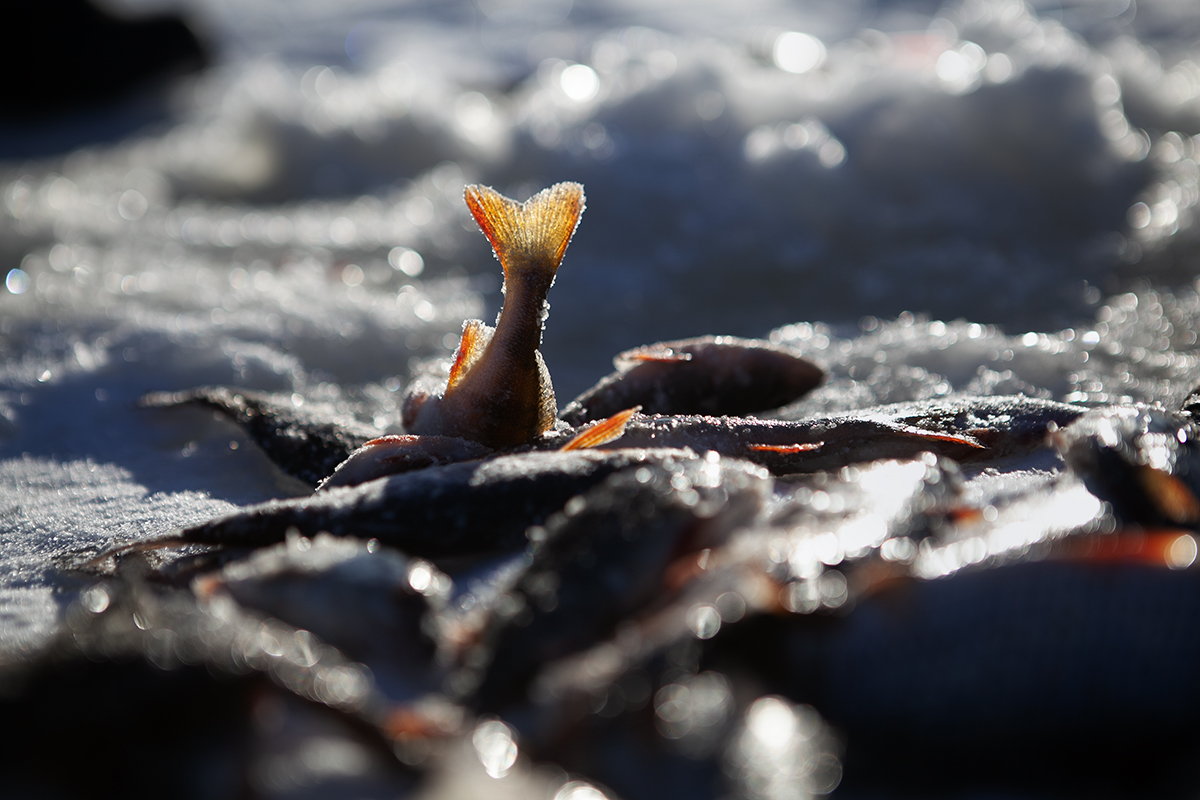 Antonova is a keeper of Karelian culture and knows other superstitions related to fishing. For example, you should not swear on the lake or complain about a bad catch. And if the first catch of the year is good, Karelians would not bring it home. They would cook fish soup and leave it on the shore – they donated their first catch to the water spirit. He would then make it so that fishing would be successful for the entire season. Some Karelians still do this.
Antonova is a keeper of Karelian culture and knows other superstitions related to fishing. For example, you should not swear on the lake or complain about a bad catch. And if the first catch of the year is good, Karelians would not bring it home. They would cook fish soup and leave it on the shore – they donated their first catch to the water spirit. He would then make it so that fishing would be successful for the entire season. Some Karelians still do this.
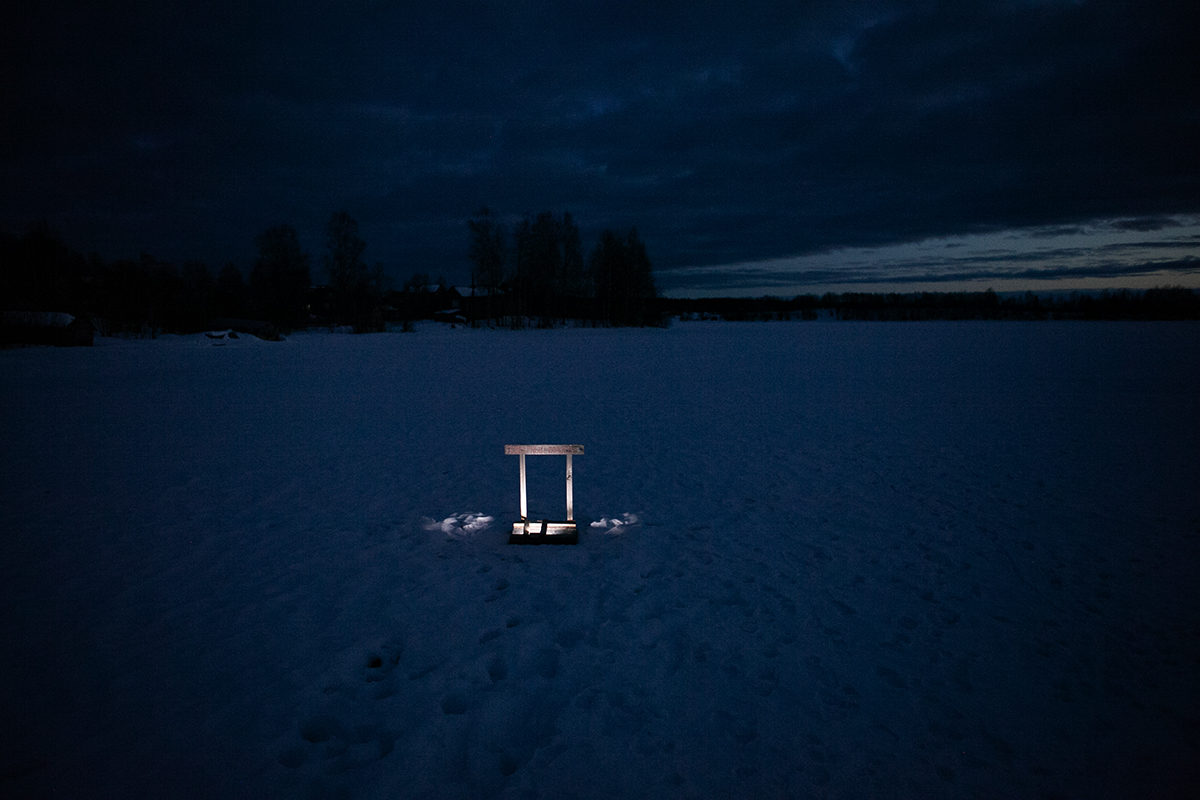 Lyuba doesn’t believe in superstitions, especially those related to weather. She doesn’t use an almanac to see which days will be favorable or unfavorable for fishing. If she’s in the mood, she goes. If not, she stays home.
Lyuba doesn’t believe in superstitions, especially those related to weather. She doesn’t use an almanac to see which days will be favorable or unfavorable for fishing. If she’s in the mood, she goes. If not, she stays home.
Like Olga Pekshuyeva, Lyuba does not fish because she does not earn enough money to live on. But fishing saves her all the same: from a monotonous home life and from the people who drove her crazy over her years working as a secretary.
“It’s like I get a boost of energy here,” she says. “Even if I don’t catch anything, it’s still good. But I also love fish, I can eat it three times a day. And only fresh! If it’s been lying in the fridge, I won’t eat it, I’ll go and catch something fresh.”
Valentina Moiseyeva
Chernaya Lamba Village
Valentina Moiseyeva is 64 and lives in the village of Chernaya Lamba with her husband, her son Vladimir, and two small grandchildren. It is on the outskirts of the village Savinovo, which is also small, without a single paved road, but located between two lakes.
 Valentina’s home is warm and cozy. On the walls hang her works of cross-stitching: poppies, horses, a girl with a baby. Nearby is a fishing calendar. On it, the days when fish are expected to bite are circled. In the living room there are toys. On the sideboard are children’s crafts.
Valentina’s home is warm and cozy. On the walls hang her works of cross-stitching: poppies, horses, a girl with a baby. Nearby is a fishing calendar. On it, the days when fish are expected to bite are circled. In the living room there are toys. On the sideboard are children’s crafts.
Her granddaughter is nearly five, her grandson is six. Their mother, Valentina’s daughter-in-law, lost her parental privileges three years ago. Valentina says that her son would not be able to cope as a single father with two children, which is why he came home to live with her. Thus did the grandmother become a mother again.
“Since the grandchildren showed up, I haven’t embroidered anything,” Valentina smiles. “It’s difficult with little ones…”
Valentina didn’t plan on a second round of mothering. It was hard enough raising two sons and a daughter, and she had just started living: fishing, embroidery, the forest. And now this. 
It’s difficult to persuade Valentina to talk about herself. As soon as she pours the tea, she immediately takes out her phone and starts showing us photos from her fishing trips. She has a huge archive. Here she is in a boat, and here is a cat in the boat. And here she is with her grandchildren on the lake, all three of them have fishing rods. And here she is with a pike. And here is a bucket with a perch… Then, suddenly, a fox crept up to the house, but Valentina’s cat, Luntik, sits calmly on the snowmobile near the porch and doesn’t give a damn.
“Valentina, what amazing photographs! Please, let’s talk about you!”
Necessity
Valentina was born in Savinovo. Her mother worked as a milkmaid at a farm’s breeding center. She oversaw calvings. The work was hard, and Valya helped her mother from an early age, watering calves, milking cows. And, starting in the eighth grade, she too oversaw calvings.
“Before school, at five in the morning, my mother would wake me up: ‘Valya, there’s lots of work to do. Come help!’ What should I do? I go, yawning, to the calf shed with her… Then I come home, wash up — and go to school. And so on, until school is over.”
In her free time, Valentina’s mother would go fishing and took her daughter along. So it is that Valentina has been interested in fishing since childhood. True, it was not always a hobby. There was a period of “necessity.” 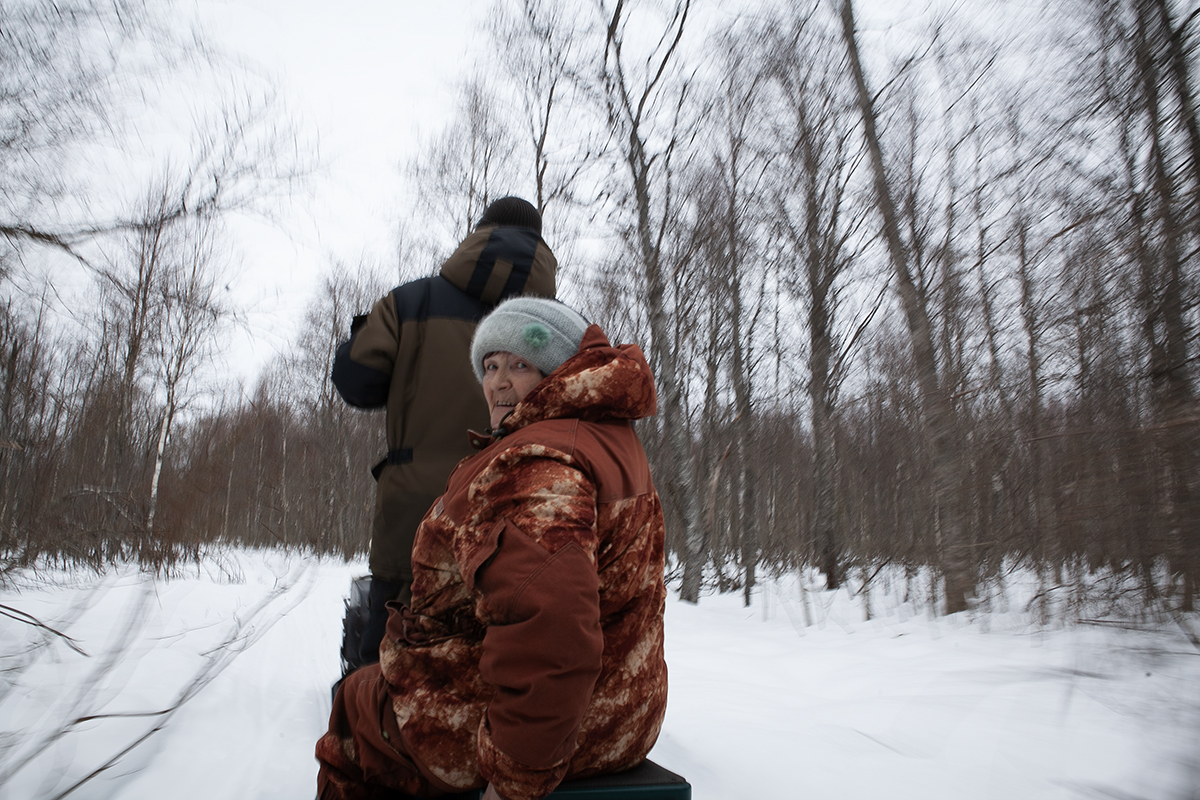
After she finished school, Valya went to Petrozavodsk and entered a vocational school to become a refrigeration technician. She and a friend chose the profession at random – she had no idea what she really wanted to be. But she never got to work with refrigerators. After her studies, she went to Pryazha and got a job on a fur farm, raising arctic fox and mink. She had loved animals since childhood and liked her work as a fur farmer.
In Pryazha she got married and gave birth to three children. Sometimes she went fishing with her husband, but she wasn’t fanatical about it. Her husband started drinking, and in 1991 he hung himself. Valentina’s eldest son was just 10.
 “He was drunk. At two in the morning he started getting ready to go somewhere and wanted to take Seryoga, my middle son, with him. He was eight then. I said: ‘You’re not going anywhere at night with a child!’ He had a toothache, he kept drinking this phenazepam or something, I don’t remember, and probably he went crazy. He took an extension cord. I grabbed the extension cord, saying, ‘Come on, Lyosha, go to bed.’ He seemed to lie down. And as soon as my head hit the pillow, I fell fast asleep. I even slept through work. At nine, the neighbor came by, saying, ‘Valya, are you getting ready to go to work?’ I told her how all night Lyosha had been threatening to hang himself. And so we went to work, and she happened to look into the barn: ‘Valya! He’s hanging!’ I collapsed right then and there.
“He was drunk. At two in the morning he started getting ready to go somewhere and wanted to take Seryoga, my middle son, with him. He was eight then. I said: ‘You’re not going anywhere at night with a child!’ He had a toothache, he kept drinking this phenazepam or something, I don’t remember, and probably he went crazy. He took an extension cord. I grabbed the extension cord, saying, ‘Come on, Lyosha, go to bed.’ He seemed to lie down. And as soon as my head hit the pillow, I fell fast asleep. I even slept through work. At nine, the neighbor came by, saying, ‘Valya, are you getting ready to go to work?’ I told her how all night Lyosha had been threatening to hang himself. And so we went to work, and she happened to look into the barn: ‘Valya! He’s hanging!’ I collapsed right then and there.
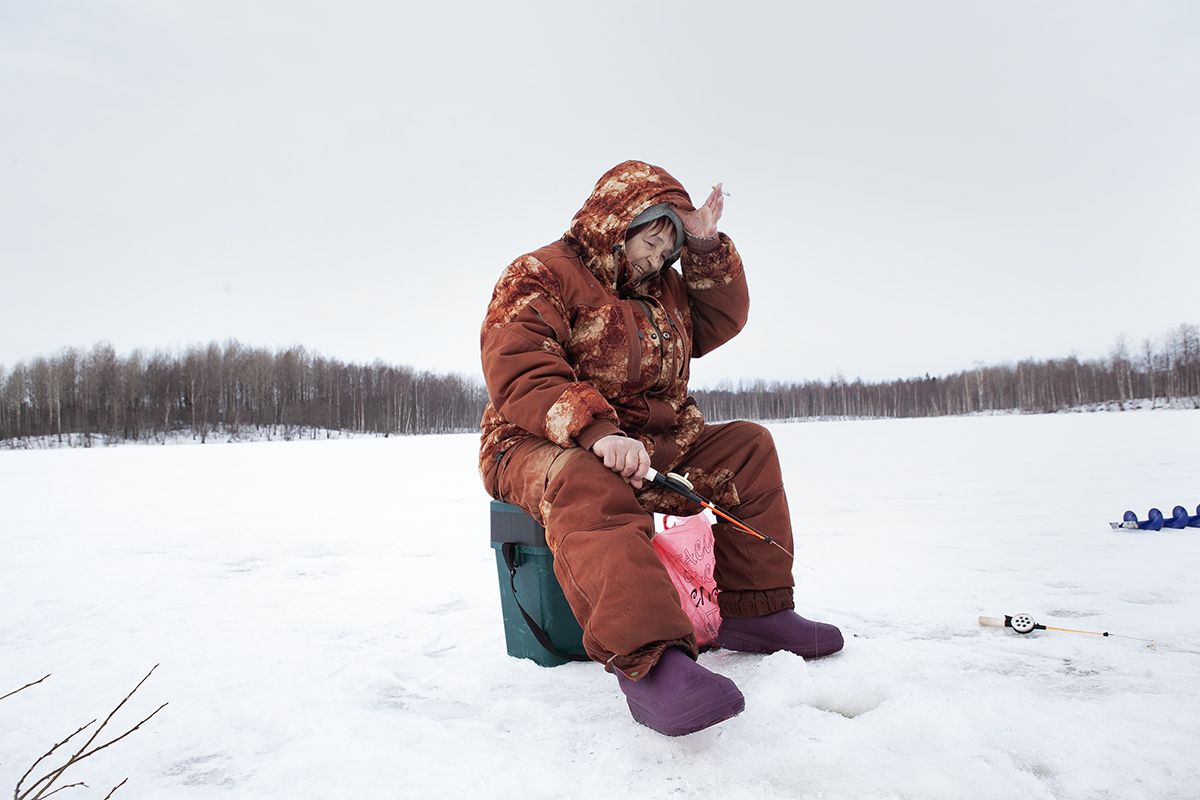 “And that’s how I was left alone to raise three children. We survived on my salary and the survivor’s pension. And, of course, my mother helped a lot, both with physical tasks and with money.
“And that’s how I was left alone to raise three children. We survived on my salary and the survivor’s pension. And, of course, my mother helped a lot, both with physical tasks and with money.
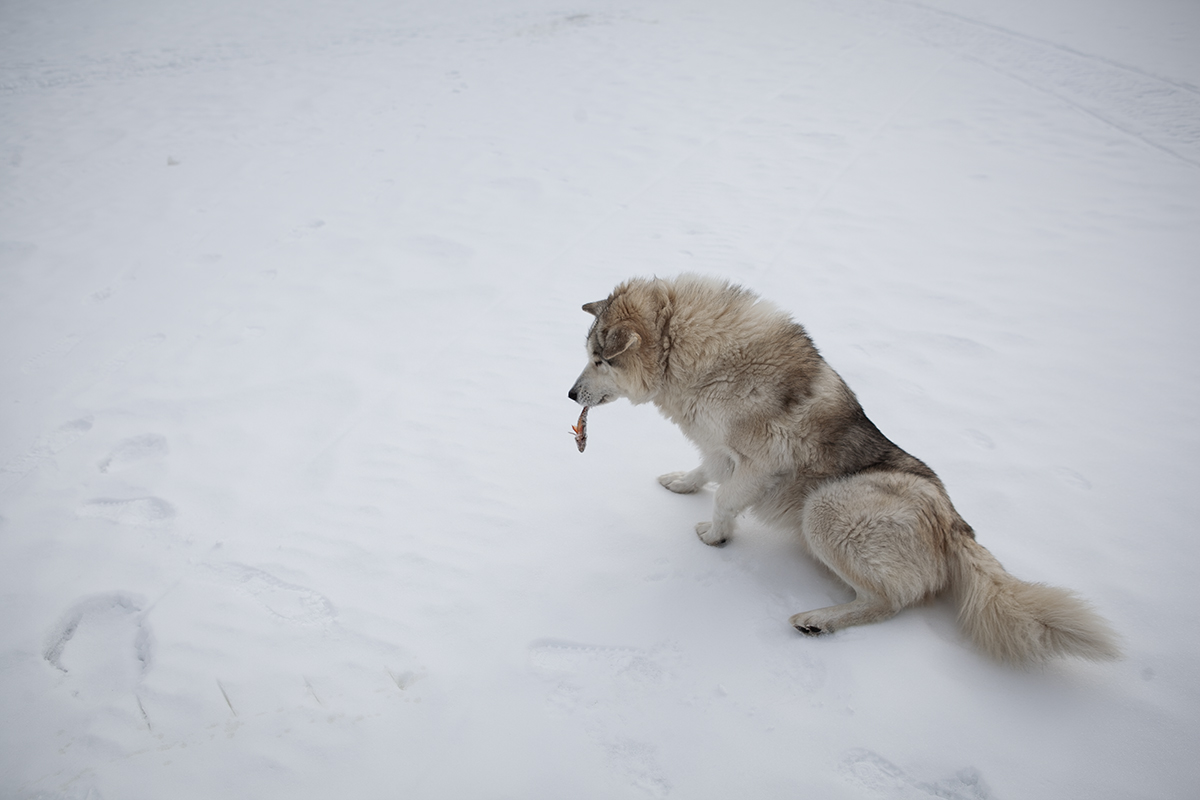 “Then I started fishing with the children. It made us happy, and then we ate the fish together. You know the sort of sprats you can make from ruffs! You won’t find anything like that in any store! You don’t even need to clean them. You pour in vegetable oil, add spices, salt, cover it with a lid, and you can put them on the fire, or in the oven – anywhere. You need to cook them for six hours. And then everything is so soft, the bones melt…
“Then I started fishing with the children. It made us happy, and then we ate the fish together. You know the sort of sprats you can make from ruffs! You won’t find anything like that in any store! You don’t even need to clean them. You pour in vegetable oil, add spices, salt, cover it with a lid, and you can put them on the fire, or in the oven – anywhere. You need to cook them for six hours. And then everything is so soft, the bones melt…
“I am a lucky fisherwoman. I remember sitting at the hole. They were biting good. I caught one after another and piled them up next to me. My friends, a father and son, were walking by. The son saw my mountain of fish and said, ‘Wow, dad, look how the fish are biting today!’ And his father replies, ‘The fact that Valentina has fish near the hole doesn’t mean that they’re biting. She, son, can catch them from a well!’”
After her husband’s death, Valentina lived in Pryazha for another 10 years. In 2001, she returned to live with her mother in Savinovo. And there she met Victor. She was not going to marry a second time, but Victor turned out to be a persistent suitor. They fished together until a few years ago, when he injured his leg. Now Valentina fishes alone. Well, not alone. She has two companions – her cat Luntik and her dog Buran.
A Scarface Fishing Inspector
Valentina dresses warmly, leaves the house, and the animals immediately flock to her from the yard to accompany her to the lake. The cat Luntik walks calmly at her side, while out in front of them the dog Buran hops on three legs. They walk with their owner all the way to the lake, then patiently wait for her to drill a hole and start fishing.
 Several years ago, Buran got caught in a wolf trap in the forest. Valentina looked for him and decided that he had been taken by wolves. Then, 10 days later, hunters heard a desperate howl in the forest and found the unfortunate Buran. They freed him and brought him home.
Several years ago, Buran got caught in a wolf trap in the forest. Valentina looked for him and decided that he had been taken by wolves. Then, 10 days later, hunters heard a desperate howl in the forest and found the unfortunate Buran. They freed him and brought him home.
“His paw was already hanging off him, it had atrophied over so many days. He all but died there… We called a vet, who gave him an injection, but it didn’t help. He dragged his paw for another week, and then he just bit it off himself. At first, he walked slowly, but now he frolics about like crazy! We go to the lake on a snowmobile, and he runs through the snowdrifts, even outrunning us!”
 Luntik has been luckier: all his paws are in place. His muzzle is, however, ragged – he is a fighter, yet there are no other cats in the village. Valentina jokingly calls Luntik “The Fishing Inspector.” When she is home, he sits on the smoker by the door, as if guarding it. When at the lake, he keeps close to Valentina’s feet and peers into the hole. In the summer, he also accompanies her fishing: he climbs into the boat and waits for the fish to fly off the rod.
Luntik has been luckier: all his paws are in place. His muzzle is, however, ragged – he is a fighter, yet there are no other cats in the village. Valentina jokingly calls Luntik “The Fishing Inspector.” When she is home, he sits on the smoker by the door, as if guarding it. When at the lake, he keeps close to Valentina’s feet and peers into the hole. In the summer, he also accompanies her fishing: he climbs into the boat and waits for the fish to fly off the rod.
The fish are not biting very well today. Valentina moves from hole to hole until she finds the one that is the most “fertile.” The first fish goes to Luntik. He crunches the perch with gusto, spitting out the caviar: he’s not a fan. The second fish goes to Buran – the dog also relishes his share of the catch.
 “I really like winter fishing in particular,” Valentina says. “You just sit and sit; you don’t have to row anywhere in a boat. I told my family: ‘When I die, put a spinning reel and a fishing pole in my coffin.’ We usually fish like this until May. And then, when the lake melts, we put out nets. And you get to fish all year round.”
“I really like winter fishing in particular,” Valentina says. “You just sit and sit; you don’t have to row anywhere in a boat. I told my family: ‘When I die, put a spinning reel and a fishing pole in my coffin.’ We usually fish like this until May. And then, when the lake melts, we put out nets. And you get to fish all year round.”
When Valentina has had her fill of fishing, she reels in her lines, the cat and dog jump up, as if on command, and prance off homeward with her, Buran in front, Luntik pulling up the rear.
Valentina loves her animals very much and dotes on them – both the cat and the dog are plump and affectionate.
 At home, Valentina sits by the stove cleaning the fish. She rips open their bellies and cuts off the fins. Then she immediately fries them. It seems like the fish don’t finally die until they hit the frying pan.
At home, Valentina sits by the stove cleaning the fish. She rips open their bellies and cuts off the fins. Then she immediately fries them. It seems like the fish don’t finally die until they hit the frying pan.
The grandchildren are about to return from kindergarten, so we quickly take a look in the barn. It’s a treasure trove full of fishing gear: nets, fishing rods, fishing poles. And – unexpectedly – an electric bike. We are surprised: “Where is that from?”
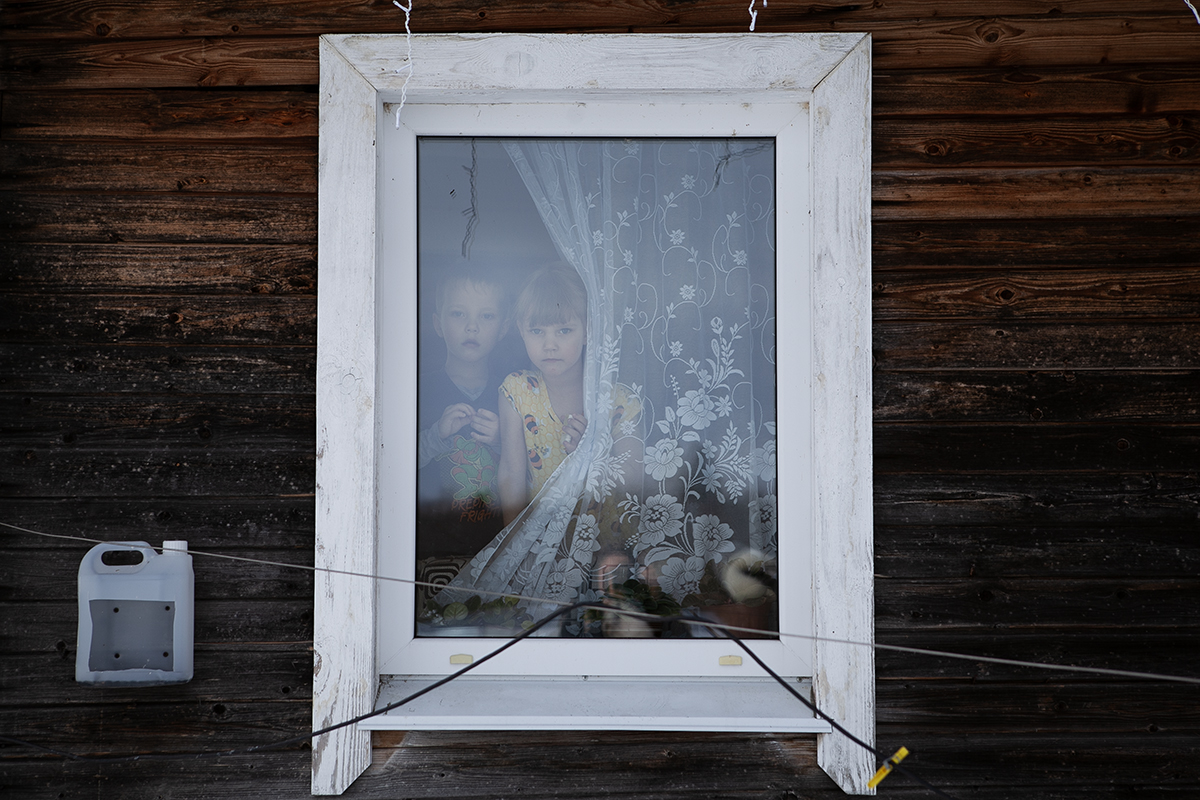 Valentina explains that in summer she picks and sells berries. She dreamed of having a bike like this, so that she could go further into the forest. She saved money from her pension for a long time and put aside money from berry sales. And she saved up enough! Now she rides it to pick blueberries.
Valentina explains that in summer she picks and sells berries. She dreamed of having a bike like this, so that she could go further into the forest. She saved money from her pension for a long time and put aside money from berry sales. And she saved up enough! Now she rides it to pick blueberries.
When asked how she and her husband, living on a pension, distribute the household budget, Valentina says that, first of all, they buy everything that the grandchildren need. She does not deny them anything. If Veronika wants a peeing doll, Valentina orders a doll on Ozon. If she wants a 3D pen, Valentina buys one. To have enough for everything, Valentina picks berries in the summer and works in her garden.
“I get up at five in the morning,” she says, describing her day. “I light the stove and cook the food. I surf the internet. I take the kids to kindergarten and go fishing. And that’s where I relax. Then I come back from fishing, and I need to clean the fish, put them away. Then I cook again. The kids come home from kindergarten and I work with them. And at about 10 I go to bed.
“How do you not die of fatigue?”
“God helps. And how could I die, I need to raise the kids. It’s hard when they’re little, but when they grow up together – that’s good.”
Vacation is Boring
The children come home from kindergarten and hang off their grandmother’s neck. The first order of business is to change their clothes and comb their hair. Then make dinner. Valentina asks them what went on in kindergarten, and they talk non-stop.
Babushka does it all: dressing, braids, feeding, making crafts for kindergarten, learning poems. Their father does not stand on the sidelines, but the children need their mother. And Valentina stands in for her.
She worries that her grandchildren have “been given a fate such that no one needs them” except for their dad, her, and Grandpa Vitya. “What did they do wrong?” she asks. We don’t know how to answer.
Finally, we ask if Valentina has ever been on a real vacation. Perhaps to the sea?
“Yes,” she answers. “Five years ago, when the grandchildren had not yet appeared here, my husband and I went to Sochi.”
“Did you like it?
“Yes. But it was boring! No mushrooms, no berries!”
Galina Martynova and Irina Ivanova
Kinelakhta Village
Irina Ivanova and her husband Vladimir live in Petrozavodsk. But they spend a lot of time in Irina’s childhood home in the village of Kinelakhta. Irina’s mother, Galina Ivanovna Martynova, also lives there. A vital woman of 73, Galina was once an inveterate fisherwoman.
Fishing has been passed down through the generations in Galina’s family. Her grandmother was the family’s fisher-in-chief. 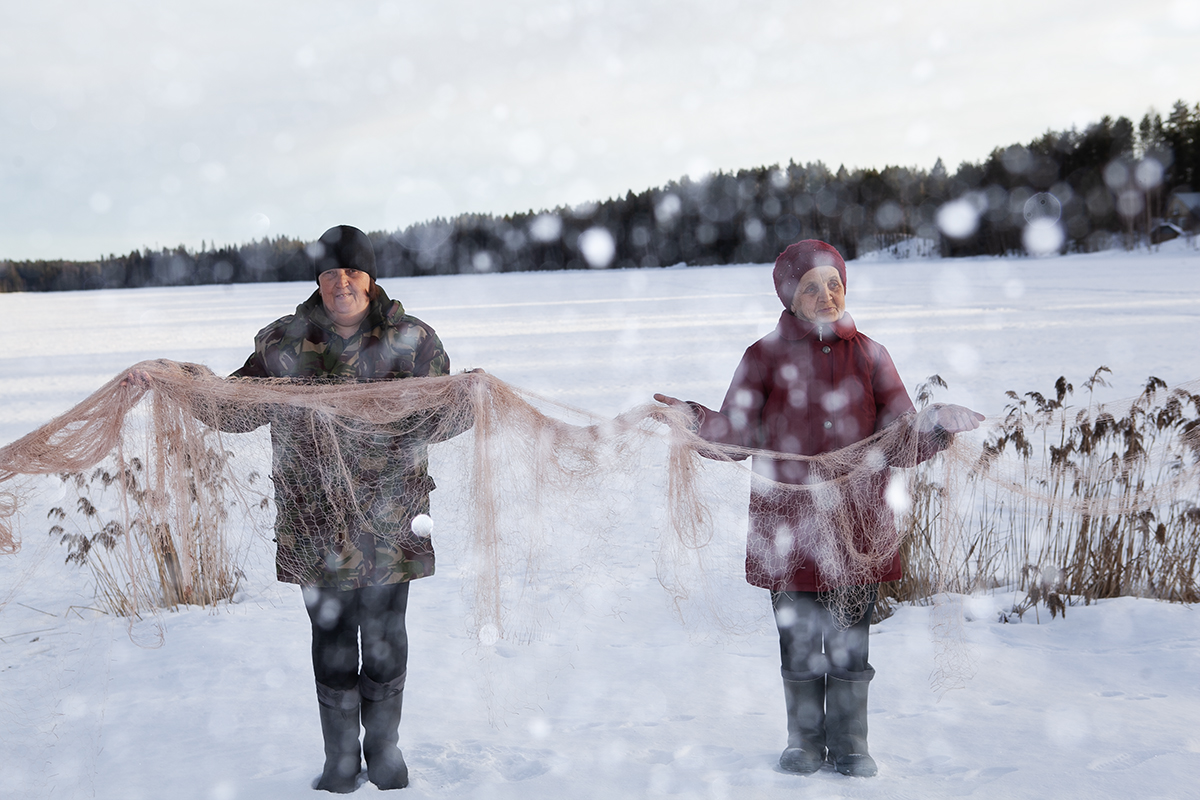
“My grandfather was arrested and shot in Sandarmokh,” Galina says. “My grandmother was left alone with five children. To feed them, she began to fish. She learned to weave nets, for which she made the flax threads herself. There was nothing back then! In the morning, she would walk three kilometers to the lake. She would set up the nets. Later she would collect the fish and bring them home… She told me how her neighbor took to stealing fish from her nets. She would go to check the gear – and there would be nothing there. The second time she went – again nothing. And the third time she went and a neighbor was walking towards her with fish. The next time she went to the lake a bit earlier. And she was a hunter, she could shoot a squirrel right in the eye with a Berdan rifle so as not to damage the pelt – you had to turn the pelts over back then… And so she hid in the bushes. The neighbor came and shook her fish from the net. She aimed her gun at him: ‘Put ‘em back or I’ll kill you now!’ The man got scared and started apologizing, saying he wouldn’t do it again. ‘Don’t you have any shame, man?!’ she said. Really, how could he take the catch from a woman, a single mother with many children!”
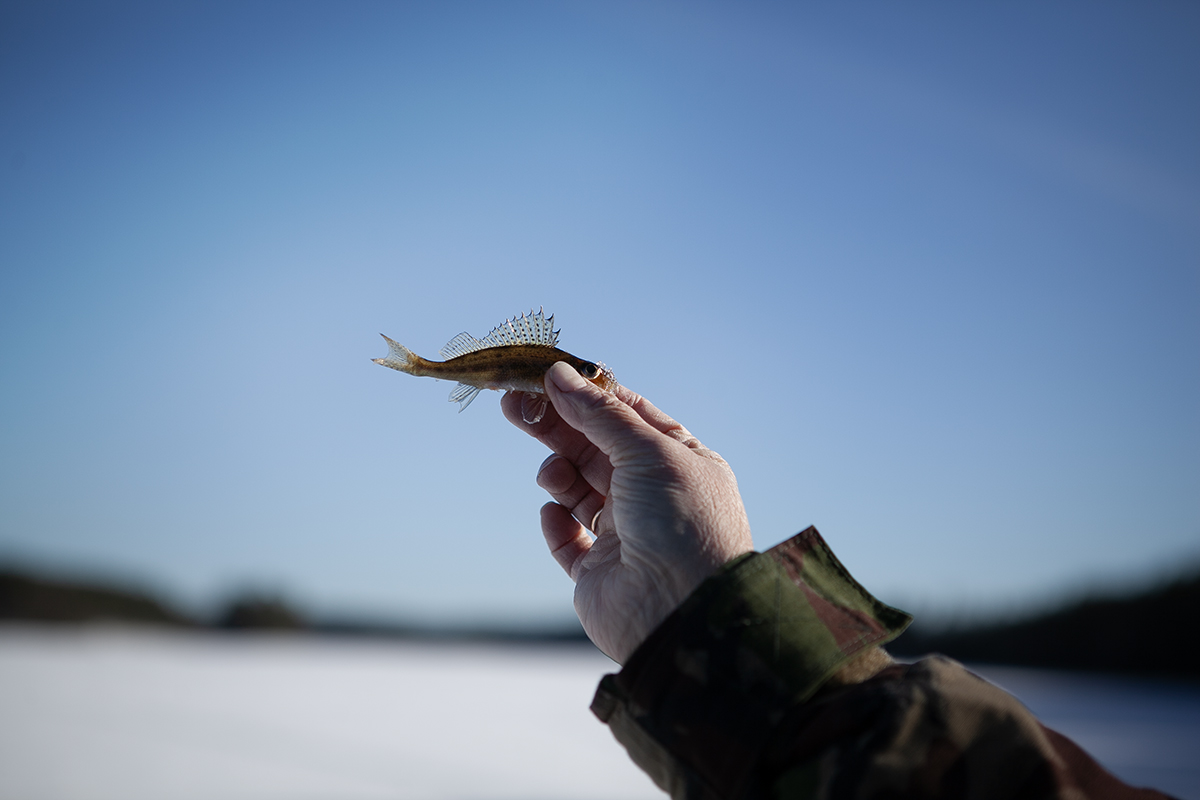 According to Galina, no other women from their village fished. And their house always had fish, thanks to their grandmother. It was under her guidance that Galina first picked up a fishing rod. Later, she fished with her husband Vasily. When Vasily died of cancer, Galina fished alone for a long time.
According to Galina, no other women from their village fished. And their house always had fish, thanks to their grandmother. It was under her guidance that Galina first picked up a fishing rod. Later, she fished with her husband Vasily. When Vasily died of cancer, Galina fished alone for a long time.
Galina named her daughter Irina in honor of her grandmother. And she did not imagine that, along with the name, she would also pass on her passion for fishing. 
“Vasya and I fished with a rod, and with a net,” Galina says. “We bought ourselves a Buran [snowmobile] and went fishing in the winter.”
“We fished beneath the ice with a net – that’s a difficult task,” Galina says. “We always took our daughters with us. One daughter lives in Olonets now; she wasn’t really into fishing. But when I look at Ira, I see my grandmother. Several years ago, I almost stopped fishing: my health is not what it used to be. I passed the baton to my daughter. She and her husband bring fish, and I clean them.”
This time, however, Galina is going fishing with us. We go on a snowmobile to Lake Sinemuksa. Irina and Volodya already have lines laid there – we need to check them. Ira drills a hole for her mother, and Martynova, with a look of satisfaction, sits down on the smoker with a donka – a weighted line for bottom fishing.
The fishing today is fantastic. We barely manage to pull out one perch before the next starts biting. Irina manages to catch five with one lousy maggot. Galina is not far behind either. When suddenly she catches a ruff, Irina lifts the fish above her head and looks at it in the sun: “Look how its fins are fluffed up, how beautiful!”
Irina says that she can do any sort of fishing that men can. Whether it’s trolling, ice fishing, or nets. She has never heard men make disparaging remarks about her. 
“There are superstitions that say, if you take a woman fishing, there will be no fish,” Irina says. “But that’s not how it is with us. I fish at the same level as Volodya, and the men treat me the same way they treat him. This summer we were trolling. We were trolling, and I felt the tug of a pike. Volodya stopped, I pulled on the spinning rod. It was hard, then it was easy, then it was hard again… And easy again. Volodya stood with his landing net at the ready. I lifted it, and he says: “Two!” Can you imagine, a one-and-a-half kilo pike took the hook, and another one of five and a half kilos dug its teeth into the first. And we caught both. What man ever got anything like that?”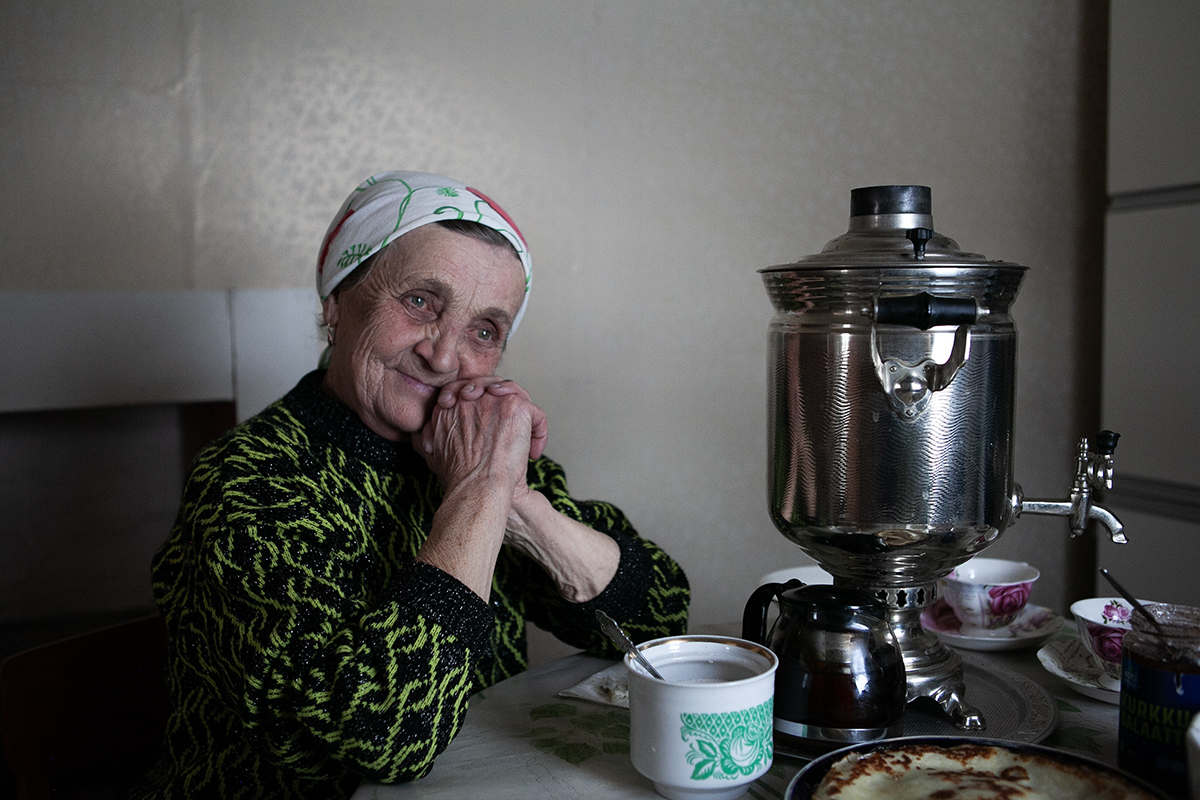
After fishing, Galina Ivanovna treats us to fish soup, homebrew, pancakes, and tea from the samovar. While the samovar is heating up, she shows us the pantry, where the freezers are packed to the brim with fish. Today, the hunger that filled her childhood is no more. But there are always plenty of fish in the house. And she always eats it.
During dinner, mother, daughter and Natalya Antonova, who came with us, speak Karelian. They strip the fish clean from the fish soup, sucking on every bone. This is how their parents taught them when they were young. Fish is very valuable in Karelia, Antonova says. Karelians even commemorate their dead with fish. But never with a predator fish (like pike or pike perch). Only with vendace, roach and perch.
After dinner, Galina Ivanovna takes us to the barn, where she shows us the traps and nets she inherited from her grandmother. Irina takes a net on one side and Galina on the other. The thin, fish-scented threads seem to form a special and very strong connection between them. And, in time, someone will surely take up Galina’s end of the net when she is gone. 

Every day we write about the most pressing social problems in our country. Based on our experience, we are certain it is feasible to address and deal with them only by reporting the real state of affairs. This is why our team travels across the regions, takes interviews, talks to people and experts, does photo reportages to sportlight and document people’s lives and stories. We collect money for charity organisations without any commission on our part.
Our media exists due to donations. We hope you can consider subscribing for a monthly donation to support our project. Any help is valuable, especially if it is set on a regular basis. Any sum from you is an opportunity for us to plan our work.
Please, sign up to donate and sustain our media and cause.
Donate